

Urban evangelisers: Cathedral parish launches mission Page 4
Western Australia’s Award-winning Catholic newspaper
Year: Australian bishops issue Year of Eucharist program Page 5
Readers make their decision Page 11
Perth, Western Australia ● $1
Greek sojourn: Perth seminarians reflect on an historic visit Pages 7-9
Letter to Minister
Archbishop reminds government of forgotten promise to protect embryos
Archbishop Barry Hickey has asked the Federal Government and the Opposition to extend the protection currently offered to “excess” embryos created after April 5, 2002.
He has written to the responsible Minister, Julie Bishop, MP for Curtin, and the Federal Opposition Leader Kim Beazley, both of whom are West Australian MPs.
When the Research Involving Human Embryos Act was introduced in 2002, it approved destructive experimentation on embryos created before April 5, 2002.
It also provided that the Act would be reviewed this year, and that the protection of post-2002 embryos would be automatically repealed on April 5, 2005.
The Australian Catholic Bishops Conference had now been informed that the review would not be completed until December. This meant that the protection offered to post-2002 embryos would be abandoned, regardless of what the review may recommend about it.
Archbishop Hickey said the 2002 deadline was introduced by Prime Minister Howard as a compromise in the face of widespread community concern about the destruction of human embryos. It was always understood that the removal of that limitation would be part of the review.
“I think most Australians would find it hard to believe that Parliament could treat them so cynically as to have intended otherwise,” he said.
He told Ms Bishop, Federal Continued - Page 10
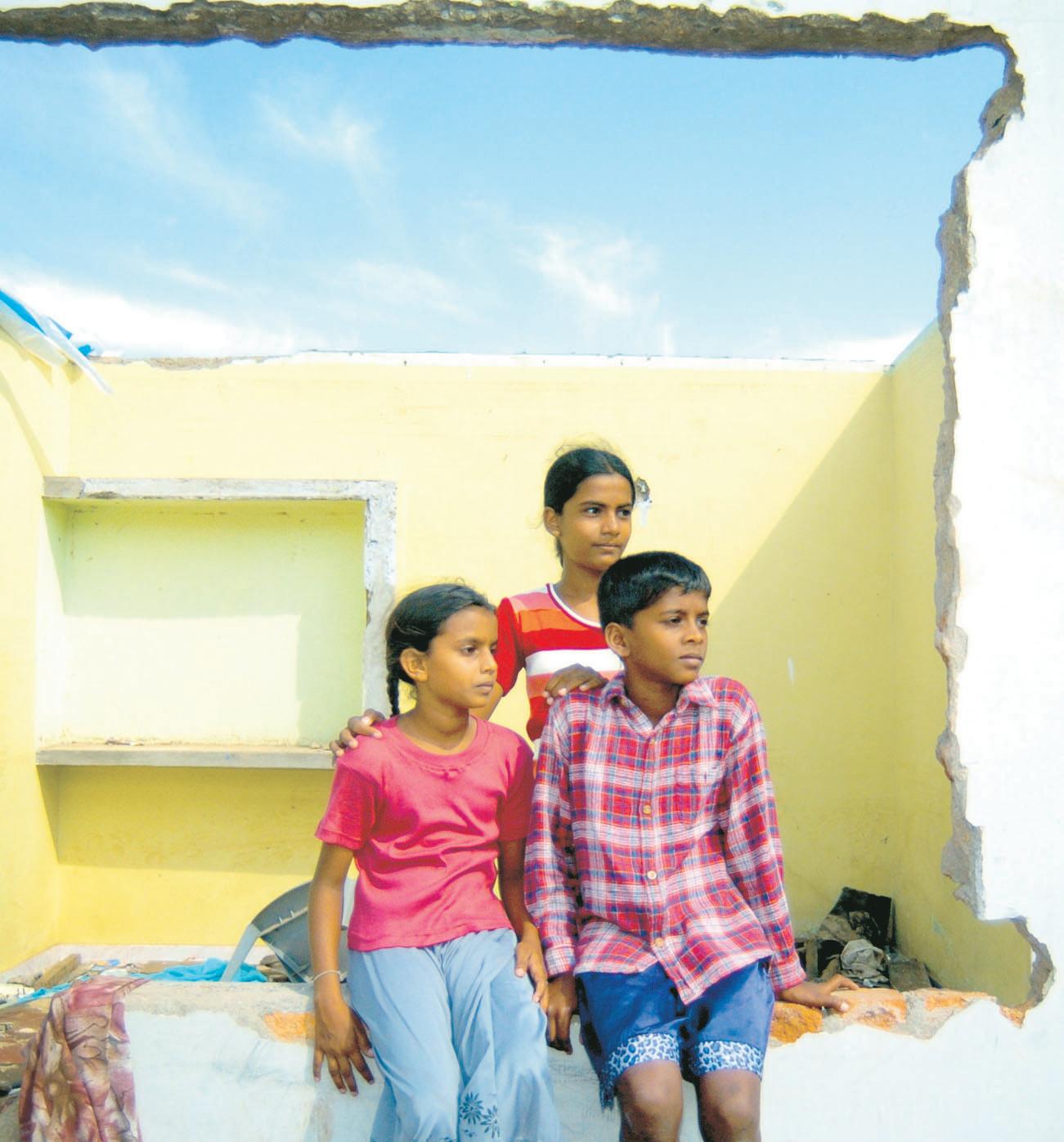
Balcatta invites ex-Catholics to return
■ By Mark Reidy
A Perth parish has reported a good response to an initiative to call Catholics back to Church participation and the discovery of Jesus in the Eucharist.
As a response to Pope John Paul II’s request to consider this year as “The Year of the Eucharist”, the Parish of Saint Lawrence and Mary Immaculate in Balcatta last November sent out 8366 invitations to encourage their lapsed
The Devil you do...
brothers and sisters to rediscover the Real Presence of Christ by returning to their Church.
A letter was sent to every house within the parish boundaries as an insert in the local “Stirling Times” Newspaper that month.
The letter was an attempt to reach out to those who are baptised as Catholics but no longer attend a church.
Parish Priest Father Francis Kot said the unique approach was his church’s contribution to the
An Italian priest has told an exorcism conference that while expelling devils is important, far fewer people need exorcism than most might think

Pope’s call. Project coordinator, Jenni Young, said that the endeavour had created a unity within the Parish as individuals teamed together to bring about the exercise.
Intercessory groups prayed for each person that would receive the letter whilst other parishioners combined with staff at the Primary school to complete the practical necessities.
Mrs Young said that the Pope’s call to focus one’s self on the
gift of the Eucharist was the inspiration for the letter being sent.
With the decreasing numbers of Catholics attending Church she believed it was time that people should recognise the Eucharist as the gift that nourishes Faith. She believed it was the perfect
Mission body appeals for urgent aid
One knife for 70 families in Sri Lanka
The Australian office of Catholic Mission, the official aid and missionary outreach agency of the agency of the Catholic Church, has appealed for funds for a desperate situation in Sri Lanka.
Catholic Mission is charged with promoting the missionary work of the Church in over 160 developing countries throughout the world.
As families rebuild in tsunamidevastated Sri Lanka, funding is desperately needed to help with the basic necessities of life. An Australian Catholic Mission team is currently travelling around the country to assess priorities for future funding.
The group heard that the situation in one ‘tent city’ was so dire that 70 families were sharing one knife. Spoons were also in short supply and while most families had access to a communal water source, they had no cups to drink from.
Danielle Achikian, Manuela Macri and photographer Ros Cannon are accompanying Catholic Mission’s National Director of Sri Lanka, Father Tony Martyn, to conitnued on Page 2
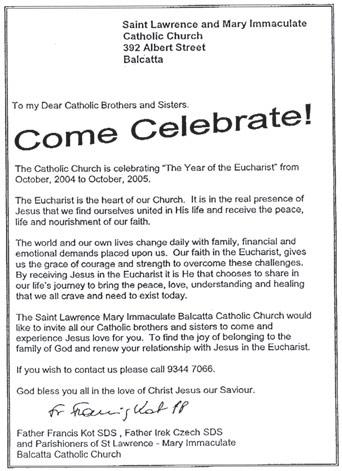
opportunity to focus attention on the living Jesus who is present in every Catholic Church and that through this Presence those who have lapsed from
Continued on page 2
Nothing but the truth
Sister Lucia confirmed she left nothing out of her accounts, says Cardinal who knew and met her before she died. But conspiracy theories will still abound...

soon to be on the Web THURSDAY FEBRUARY 24,
2005
THE PARISH. THE NATION. THE WORLD.
POLL VOTE!
Page 5
Pages 16 INDEX World News Media Classifieds Letters Editorial - Pages 12 & 13 - Page 14 - Page 15 - Page 6 - Page 6
Siblings Gayana, Ishara and Shasit lost their mother due to the tsunami and are pictured here in what is left of their home.
Photo: Ros Cannon/Catholic Mission
Little Flower will be focus of Morley retreat
Week will offer Carmelite spirituality
The Infant Jesus Parish at Morley is expecting a big turnout for its parish retreat beginning on Sunday, March 6 at the 6pm Mass and continuing with morning and evening sessions until Thursday.
The parish team has been working on the mission for several months, promoting it far and wide, and ensuring that all aspects are covered.
Parish priest Fr Gerard Moran OCD said that the retreat would give the community an opportunity to connect more deeply with

Carmelite spirituality. “We will be tapping into our interior life which eventually leads outwards in service of the Kingdom,” he said. He added that the retreat would be a renewal of life that would be closely linked to the spirituality of St Therese of Lisieux who has had a prominent role in the par-
ish since the visit of her relics in January 2003.
As the first parish in Australia to receive the relics, Morley gave national inspiration on how to receive and honour the relics, and also took a national role in importing and distributing literature on St Therese for adults and children.
The March 6-10 retreat will be preached by Franciscan priest Fr Justin Belitz who is widely known for his ability to lead people into meditation. His gentle teaching style has earned him an international reputation, and has led to repeated visits to WA over more than 20 years.
Fr Justin will preach at the
Mission Sri Lankan aid call
Continued from page 1
traumatised communities where churches and schools have been razed and many families still have no trace of lost loved ones.
“People have nothing, except the clothes they were standing in,” Danielle said from Hambantota in the country’s south.
“People are very unsure who is going to help them rebuild their homes. Employment is out the window and people are just dependent on what they are given. Many people just stand around and are not sure what to do.”
Two of the most immediate needs are milk powder for children and trauma counselling. The families have no furniture in their tents so, after it rains, mothers are nursing their babies standing in water.
“The devastation is massive,” Danielle said. “No one is sure what is going to happen next. The government has given out some money but they say it is going to take 1–2 years to rebuild homes.”
Aid agency staff have been
handing out basic items such as flasks for water, sanitary pads and children’s underwear.
These basic items are not only in short supply, their prices have also skyrocketed.
The team has witnessed the heart-wrenching grief of many families who have lost their children.
“One woman lost her only child and because she has lost everything else she does not even have a photo,” Danielle said.
“Another woman is crazy with grief – she is still waiting for her children to return.” Sri Lanka’s beautiful beaches remain a no-go zone.
“The people are now petrified of the sea,” Danielle said. “One nun was doing therapy with the children and it came out that one of their main wishes was to move to higher ground.”
The group has witnessed the untold story of Sri Lanka’s interior, where roads have been destroyed and the train tracks twisted by tremours.
“Because this area wasn’t techni-
cally affected by the tsunami itself, there is no funding to fix it up,” Danielle said.
One positive story to come from the journey is at Matara, near Galle, in the south of the country. A multipurpose hall built with Catholic Mission funds saved the lives of hundreds of people when the water surged across the coastal town.
Tragically many people worshipping in the nearby church were swept away – the water flooded into the chapel carrying loads of debris, including a car.
But those who were able to escape to the hall were saved as it is a new three-storey building.
The information gathered by the team will enable emergency funding raised through Catholic Mission’s Tsunami Solidarity Appeal to be directed to the appropriate places.
For more information about how Catholic Mission will help to rebuild Sri Lanka phone 1800 257 296 or go to www.catholicmission. org.au.
6pm Mass on Sunday. During the week there will be 9am Mass followed by retreat sessions from 9.30 – 10.30am. The sessions will be repeated from 7.30 to 8.30 in the evening. There will be morning tea and supper after each session for communal sharing, and books, tapes and CDs will be on sale, with some CDs being made during the Wednesday and Thursday sessions.
Fr Justin will also work with staff and students at the Parish School, and with after-school catechists and classes.
The Morley retreat will follow a similar program at St Mary’s
Church and hall for the Cathedral Parish in Bunbury, with morning sessions February 21-25 beginning at 9.45am after 9am Mass, and evening sessions at 7.30pm. (Contact Dick on 9721 4651 or 0419 336 389).
On Wednesday March 16 at 7pm he will speak in Francis Xavier Church, Armadale, as a follow-up to the parish mission he delivered there in October 2003.
Fr Justin will complete his visit to WA with a live-in retreat March 18-20 or a one-day retreat March 19, at Peace Be Still, Chittering (Wendy 9571 8108).
Balcatta calls exCatholics back
Continued from page 1 their spiritual homes. She said that the Parish felt a call to, “nourish our own and start at the grass roots, which is those people within our Parish and includes those who have been separated from the Church for a time.”
The fruits of the project are already beginning to show. The week after the letter went out the “Stirling Times” published a story on the Blessing of St Kieran’s Church in Osborne Park and included a picture of the Eucharist. The Parish Office has also received a number of positive phone calls regarding the letter and the 2004 Christmas Eve Children’s Mass was inundated with families expressing a desire to be involved. In 2003 it had been a struggle to
get enough numbers, but last Christmas the challenge was to incorporate the 66 children who wanted to be involved.
The fruits of the project are already beginning to show.
Father Kot has been pleased with the response from the letter so far, with enthusiasm emanating from within the Parish and also comments of appreciation from those outside it.
And with The Year of the Eucharist only in its early stages, the Community of St Lawrence and Mary Immaculate Church are looking to the future with great anticipation.
Anyone interested in learning more about this project can contact Jenni Young on 9344 7066.
Letters
PO Box 75 Leederville, WA 6902
Subscriptions
Eugen Suares administration@therecord.com.au
PO Box 75 Leederville, WA 6902
Advertising
Eugen Mattes, Carole McMillen advertising@therecord.com.au
PO Box 75 Leederville, WA 6902
The Record
587 Newcastle St, Leederville WA 6902
Tel: (08) 9227 7080
Fax: (08) 9227 7087
Journalists
Jamie O'Brien jamieob@therecord.com.au
Bronwen Clune clune@therecord.com.au
Mark Reidy reidyrec@iinet.net.au
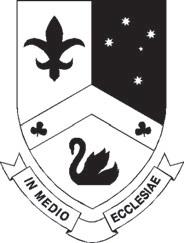




Page 2 February 24, 2005, The Record
to contact The Record
How
to the Editor
cathrec@iinet.net.au
® A division of Interworld Travel Pty Ltd Lic No.9TA796 Est 1981 200 ST.GEORGE’S TERRACE,PERTH,WA 6000 TEL 61+8+9322 2914 FAX 61+8+9322 2915 email:admin@flightworld.com.au www.flightworld.com.au Michael Deering Visit a holy place or shrine and experience the enrichment of spirituality. Book with WA’s most experienced pilgrimage travel agency. AGENT FOR HARVEST PILGRIMAGES. Reaffirm your faith Reaffirm your faith Enquire about our Cashback Offer* * Conditions apply Year of the Eucharist Holy Hour Exposition, Vespers & Benediction Sunday evenings 6:30pm – 7:30pm St Joseph’s Priory Church Treasure Road Queens Park Holy Hour Norbertine Canons Why not stay at STORMANSTON HOUSE 27 McLaren Street, North Sydney Restful & secure accommodation operated by the Sisters of Mercy, North Sydney. • Situated in the heart of North Sydney and short distance to the city • Rooms available with ensuite facility • Continental breakfast, tea/coffee making facilities & television • Separate lounge/dining room, kitchen & laundry • Private off-street parking Contact: Phone: 0418 650 661 or email: nsstormtpg.com.au VISITING SYDNEY A LIFE OF PRAYER ... are you called to the Benedictine life of divine praise and eucharistic prayer for the Church? Contact the: Rev Mother Cyril, OSB, Tyburn Priory, 325 Garfield Road, Riverstone, NSW 2765 www.tyburnconvent.org.uk TYBURN NUNS
Read it in The Record
Bishop blesses Dawesville parish
Bunbury's new Dawesville parish has been given the mission of reaching out to those who have given up the practice of their faith
■ By Jamie O’Brien
The holiday resort town of Dawesville, 20kms south of Mandurah has been officially blessed as a new parish.
Bishop Gerard Holohan of Bunbury celebrated the inauguration of the new Parish to be known as the “Blessed Damien of Molokai” Parish, Dawesville. Blessed Damien was a missionary priest from Belgium who gave up his life to work with lepers on the island of Molokai in the Hawaiian Islands from 1973 onwards, later dying of the disease.
The opening was also an opportunity for Bishop Holohan to introduce newly-appointed Parish Priest Father Leon Russell to the congregation. Fr Russell was previously parish priest of Busselton.
Some 200 parishioners, family and friends joined in the celebrations. The Dawesville Parish
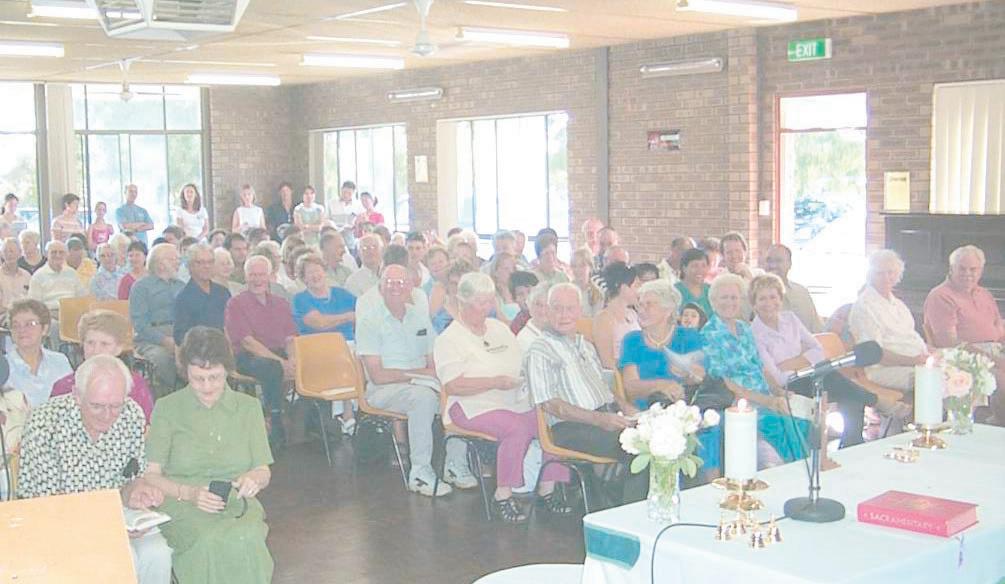
is situated at the southern part of Mandurah and includes the areas from Falcon South to Lake Clifton which were previously part of Mandurah’s “Our Lady’s Assumption” Parish.
The new Parish will cater for the anticipated population growth in that area.
A primary school will be built during this year and will become part of this new Parish.
In his homily Bishop Holohan said there were different views of whether the new parish should have been established at this time.
“The decisive factor was the statistics showing the very high
percentage of Catholics in the area who have given up the practice of their faith,” he said.
“The mission of this parish therefore is to provide for those who seem to practice their faith, to reach out to those who have given up its practice and to reach out to those who have rejected the faith.”
The foundations for the Parish were laid nearly two years ago, when Father Ian Johnson, Parish Priest of Mandurah, created a Mass Centre in the Falcon Community Hall, which was opened on Easter Sunday 2003.
Mass has been celebrated every Sunday since and the community embraced the feeling of being a small, but vibrant congregation.
Coordinator Mr Miltrup expressed the community’s confidence and enthusiasm for the challenges and rewards of creating a new parish saying that under the guidance of Fr Leon, the Parish of Dawesville would grow and prosper.
Mr Vince Spargo, on behalf of the Brothers of the Bouvard Circle of the Catenian Association then presented a new Ciborium to the parish and placed it in Fr Leon’s keeping.
Bishop Holohan concluded his homily by telling the congregation Fr Damien’s mission was to those who wanted Mass and the sacraments, and to those who had given up the practicing their faith.
“Blessed Damien’s mission was exactly the same as the purposes for which this parish is being called.”
Speakers emphasise Eucharist is the key
■ By Mark Reidy
Bread from Heaven was the theme of the 15th Annual Flame Congress presented by Flame Ministries International and the enthusiastic response of those who attended indicated that they were well nourished by the spiritual, theological and historical smorgasbord.
Held at All Saints Chapel in the centre of Perth from January 28-30, participants were encouraged to radiate their new knowledge and insights into all corners of Perth.
With Pope John Paul II having announced 2004-2005 as the Year of the Eucharist, Flame Ministries drew together a group of keynote speakers whose aim was to assist Catholics in rediscovering the reverence of the Eucharist.
Bishop Don Sproxton, Father Tim Deeter, Catholic Apologist Raymond de Souza, and Flame Ministry director Eddie Russell all
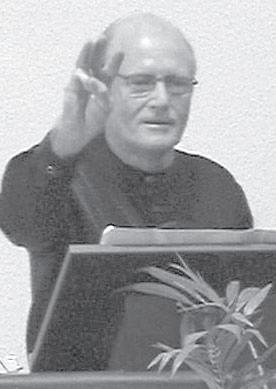 Eddie Russell
Eddie Russell
acknowledged the decline of the acceptance, even among practising Catholics, of the Real Presence of Jesus in the Eucharist. Speakers presented both the spiritual and historical foundations of the
Eucharist, from its Hebrew origins, through the early Christian era, to its relevance to the saints and its power and significance today.
With statistics indicating that only 15 per cent of Catholics attend Mass regularly and only 5 per cent of teenagers who leave Catholic schools continuing to practice their faith, the return to a true understanding of the Eucharist, which Bishop Sproxton described in the opening session as, “The Source and Summit of our Faith”, was timely.
The message that participants left the weekend with was that a rediscovery of the Real Presence of Jesus within the Eucharist was essential in reversing the trend.
Accompanying such inspiring and informative presentations were the anointed tones of the Flame Music Ministry as well as the opportunity for participants to receive prayer.
During the weekend certificates

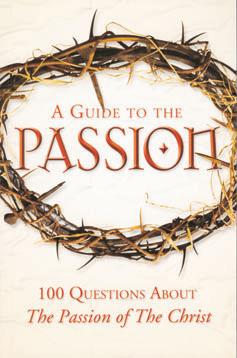
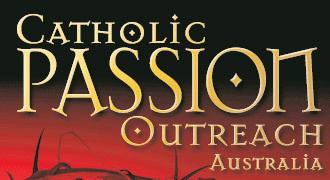
were presented to graduates of Flame's "Set My People On Fire" Seminar from 2004. Invitations were also extended to anyone wanting to participate in the next Seminar, which was to begin on February 16. The seminars unfold over 15 weekly sessions with three retreat weekends. They provide delegates with a greater understanding, depth and formation in the Word
of God and ways of applying it to their daily lives.
Anyone interested in obtaining recorded talks from the weekend (available in tape, CD and visual formats) or more information on "Set My People on Fire" can contact Flame Ministries International on (08) 9382 3668

February 24, 2005, The Record Page 3
Parishioners gather for the blessing of the new parish, which is under the patronage of Blessed Damien of Molokai.
SUPPORT JPII in uniting today's youth Your Parish can help! The book, A Guide to the Passion is being used as a fundraiser for WORLD YOUTH DAY 2005 so place your order now for Lent Contact: CATHOLIC YOUTH MINISTRIES on: 9422 7912 or fax 9422 2828
Cathedral offers city meaning of life
A new urban mission is taking place at St Mary’s Cathedral in Perth
■ By Jamie O’Brien
If you had been walking in the mall or through the streets of the city last Friday night, you may have seen a number of young and old, married and single people singing, playing guitars and knocking on doors inviting people to experience a meeting with Jesus Christ.
What may be surprising to know is that the people are from the Catholic Church.
The singing and door knocking by parishioners from St Mary’s Cathedral and St Gerard’s Mirrabooka through the streets of Perth recently is all part of a new urban mission by the Neocatechumenal Way in response to Archbishop Hickey’s call for reevangelization.
In preparation for the new urban mission, catechists from the Neocatechumenal Communites in Perth recently attended a national gathering or convivence, in Sydney, where they were able to receive a fresh impulse to evangelize.
A series of eight weeks of talks, or catechesis will begin on Monday February 28 in the Cathedral Parish Centre, 450 Hay Street Perth, at 7.30pm as part of the urban mission.
Dean of the Cathedral Parish, Monsignor Thomas McDonald said he has invited the Neocatechumenal Way to give the talks in the Cathedral parish as a way of fulfilling the desire of Pope John Paul II to re-evangelize.
Monsignor McDonald said he believes the catechesis will help the de-Christianized church re-discover the meaning of baptism.
“This is most important to reach out to Catholics who have for some
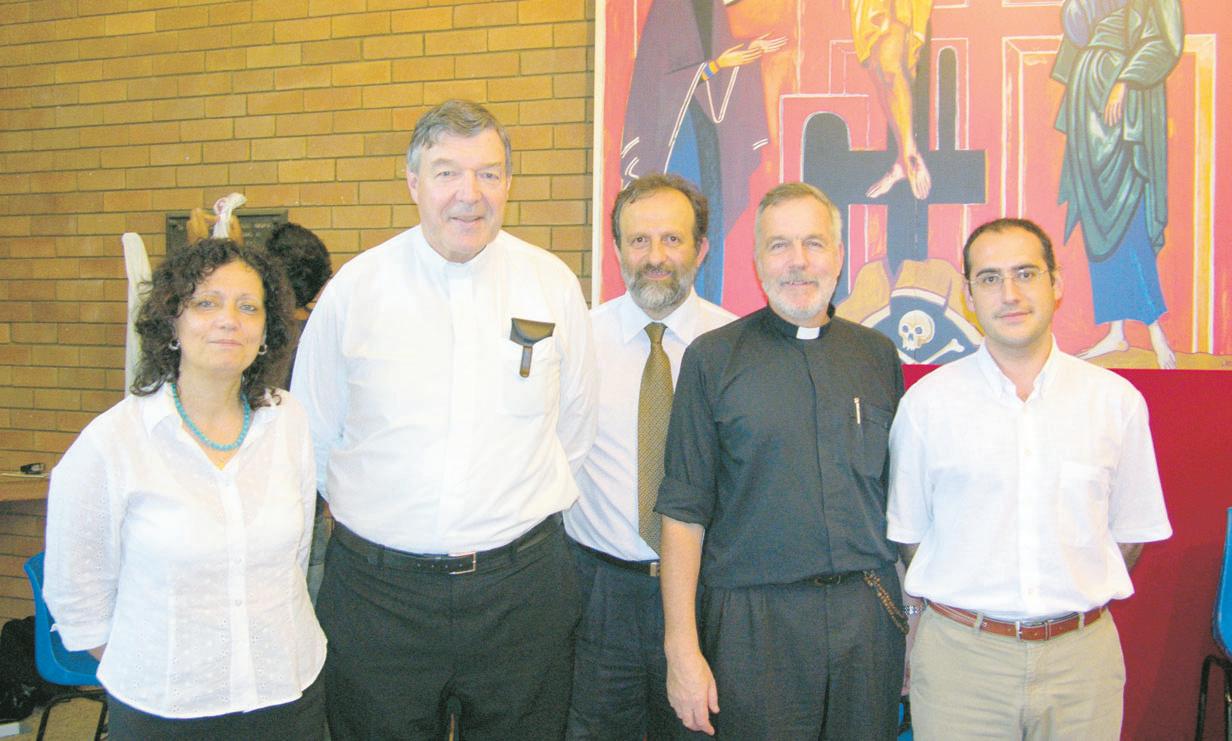
reason stopped practising,” the Monsignor said.
of Australians (about 4.5 million) declared themselves Catholics.
searching for the meaning of their life, rather than turning to the Church.”
McLuhan used the global village theory to describe how technology has conquered the tyranny of geographical distance.
The effect of this McLuhan suggested, is a new ability to experience almost instantly the negative effects of our actions on a global scale.
Mr Piccolo went on to explain that many people from the Neocatechumenal Way have themselves left the Church for a while, and have seen how the Church has come looking for them, therefore increasing their desire to announce the gospel.
The Catholic Migrant Centre is in search of volunteers who speak a language other than English.
The Community Visitors Scheme aims to provide an opportunity for people who speak Portuguese, German, Latvian, Greek, French, Hindi, Arabic, Estonian, and
According to Monsignor McDonald, the reasons people have stopped coming to the Church are varied, mostly from the misconceptions that people believe because of sin they have failed the Church.
The number of people who said they are practising, in Australia was about 15%, or 700, 000.
The ratio of practising Catholics in the Archdiocese of Perth is about one in five.
the Neocatechumenal Way in Australia Toto Piccolo said this fact is having a much stronger effect on the minds and lives of people in today’s society, thus decreasing their desire to experience a meeting with Jesus Christ.
“the world has become a global village and technology is having a much stronger effect on the minds and lives of people in today’s society. However ... the old methodology of Christ and his apostles is still efficient"
“It is possible to overcome this.” he said.
“There is plenty of room in the inn.”
Monsignor McDonald said the statistics tell an alarming story, in reference to Catholics who say are practising.
With Australia’s population set at close to 22 million, 26%
The increase in secularization has also been an added factor to people leaving the Church, the Monsignor said.
“And this can make a person very short sighted,” he said.
“The world has become a village, a global village, because of modern technology,” the Monsignor said.
National Responsible of
“However, my personal witness is that the old methodology of Christ and his apostles, announcing the Gospel in the streets = is still efficient,” he said Mr Piccolo made reference to global theorist Marshall McLuhan, who developed the theory of ‘the global village.
“This can explain why society has explored other avenues of
During the four-day convivence, which means, ‘to live together’, more than 250 catechists from Perth, Sydney, Melbourne, Canberra, Brisbane and Darwin were able to look at the situation of society, reflecting and praying how they could bring the good news to the people of Perth.
More than 20 priests from across Australia also attended the convivence, most of them the fruit of Redemptoris Mater Seminaries that have opened here in Morley, and most recently in Pagewood, Sydney.
Monsignor McDonald went on to say he hopes the catechesis will attract not only practising or nonpractising Catholics, but also the unbaptised.
The catechesis is free and open for the baptised and unbaptised, aged 13 and older.
It will take place Mondays and Fridays beginning February 28 at Cathedral Parish Centre from 7.30pm.
For more information contact Alex Coburn on 9445 3787.
New media kit aims at helping parishes Centre calls for volunteer visitors
Ukrainian to practise their first language by speaking with someone who has a similar cultural background.
The scheme provides volunteers with the chance to enhance the quality of life for residents, mainly migrants at nursing homes for a
Grief for a beloved nun
couple of hours each week.
Volunteers need to be aged 18 and over, and travel expenses are paid.
For more information contact Alicia at the Catholic Migrant Centre on (08) 9221 1727.
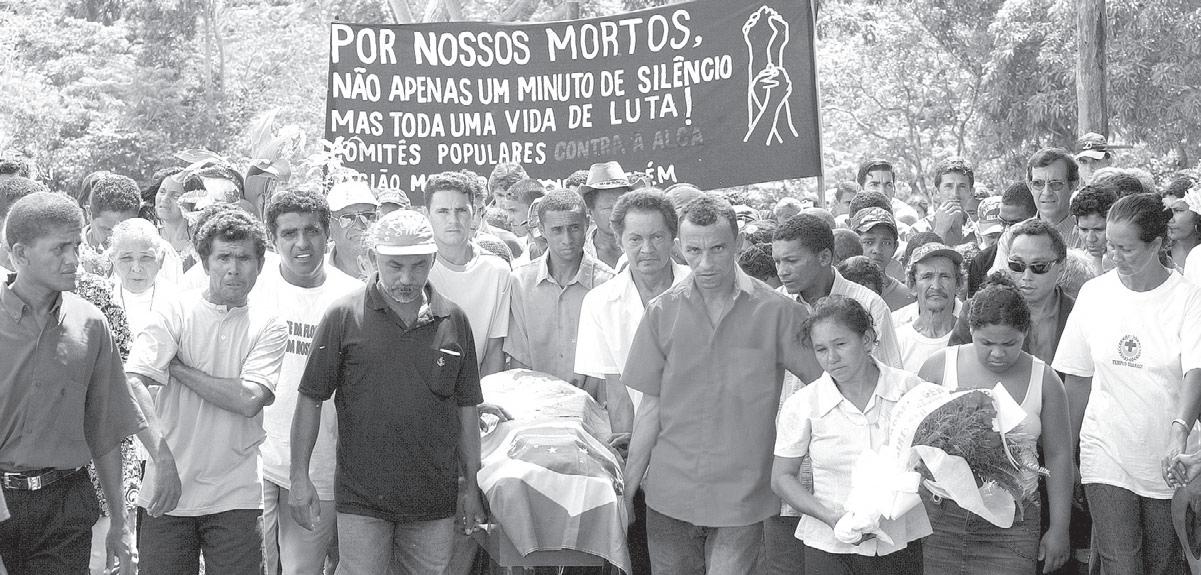
Parishes across Australia will receive a helping hand in dealing with their local media when a copy of the Parish Media Kit begins arriving in parishes this year. The kit has been prepared by the Bishops Committee for the Media to equip communities to share their Good News with skill and confidence. It will help to identify what news is. It will offer tips for identify-
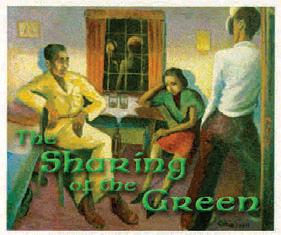
ing the news within the parish community and for providing it in the most effective way to your local media.
The kit will also examine the responsible use of the media and put forward some general principles, which guide the Church’s relationship with the media. The committee will also begin work next year on a pastoral letter on the Church and the media.
The Australian-Irish Heritage Association presents
The Sharing of the Green A Theatrical concert launching The Festival of St. Patrick set in a wee shebeen Irish Club of WA
Sunday March 6th, 3pm
$7/$5, family $10 includes Irish afternoon tea
Enquiries 9367 6026
Page 4 February 24, 2005, The Record
National Responsibles for the Neocatechumenal Way in Australia Rita Piccolo, left, next to Cardinal George Pell, Toto Piccolo, Fr Tony Trafford and Rueben Cordoba during a recent gathering of catechists from Australia in Sydney. Photo Jamie O’Brien
The coffin of murdered U.S. missionary Sister Dorothy Stang is carried by members of the Landless Movement during funeral services on Feb. 15 in Anapu, Brazil.
Photo: CNS
Darkness merely an absence of light
Real possession by devil not that common, exorcists say during lesson
■ By Cindy Wooden
The devil is real and can possess people, but it does not happen as often as many people think, said two Italian exorcists.
When a person who thinks he or she is possessed approaches a priest looking for help, they said, the priest must know enough about possession to know whether a simple prayer is called for or whether he needs to refer the person to a psychologist or to the diocesan exorcist.
To prepare priests and future priests to help people in those situations, Rome's Regina Apostolorum university -- run by the Legionaries of Christ -- inaugurated a course on Satanism and exorcism on Feb. 17.
About 120 seminarians and priests -- most of whom are not full-time students at Regina Apostolorum -- signed up for the course. Journalists were invited to the first lesson.
Father Paolo Scarafoni, a member of the Legionaries of Christ and rector of the university, told reporters: "Satanism is in fashion right now. It is being spread particularly through music and through the clothes musicians wear.
"People today find it easy to attribute strange phenomena or suffering to the devil," he said. "There are long lines of people

standing at the doors of exorcists." Father Francesco Bamonte, a noted exorcist in Rome, told the students he was fortunate to work with a team of priests and a psycholo-
Sunday the focus in new program
Australian Bishops launch Year of the Eucharist program
Australia’s bishops have issued a program for the celebration of the Year of the Eucharist, focusing on the importance of celebrating Sunday Mass.
The program, prepared by the National Liturgical Commission, is set in the context of the Sundays of Easter and is linked with a proposal for a period of Eucharistic devotion from Trinity Sunday to Corpus Christi.
The program has been designed using the dynamics of small group discussion which could be adapted to a large parish gathering or individuals.
It is hoped that youth groups, parish groups, families and individuals will use the program. It will also be of much value to those undertaking the RCIA program.
In the introduction to the program, Chairman of the Bishops’ Committee for Liturgy, Bishop Kevin Manning, recalled the invitation of Pope John Paul II for Catholics to dedicate the current year to the Eucharist.
“The Australian Bishops have responded to the Holy Father’s invitation and now offer the program, ‘Sunday: Sacrament of Easter’, to the Australian Church as a means
of enlivening our celebration of the Eucharist and to encourage devotion to the Most Blessed Sacrament,” Bishop Manning said in the introduction.
“The program focuses on the Sunday celebration of the Eucharist as this is the celebration most familiar to us all.
“To help us in this program, we are turning to the Holy Father’s Apostolic Letter ‘Dies Domini: a guide to keeping Sunday holy’ as a source for reflecting upon our celebration of Sunday.
“Beside this study of the Pope’s wisdom in the context of the Gospels of the Sundays of Easter, we would also like to invite you to spend some time in adoration of the Most Blessed Sacrament.
“We propose a parish Mission for the week leading up to the Feast of the Body and Blood of Christ as an opportunity for you and your parish community to focus your adoration of the Most Blessed Sacrament.”
Bishop Manning said it was hoped that the program would enrich the faith of all who participate in it.
The program is available on the Australian Catholic Bishops Conference website at www.acbc.catholic.org.au.
gist "who screen all the requests for exorcism. Otherwise I would not have time for the people who really need me."
The priest, a member of the Servants of the Immaculate Heart of Mary, said "several hundred" people approach his team each year thinking they are possessed.
After counseling, he said, "I do maybe 20 exorcisms each year."
"If we identify the light, if we identify the grace of God and follow it, we see the darkness only out of the corner of our eyes. But if we take our eyes off the candle, we see only darkness,"
Father Scarafoni said that, generally, "85 percent to 90 percent of these people are not possessed or even being attacked by the devil. They need someone to listen. They need a prayer. They need a long walk and a glass of water."
The Regina Apostolorum course, he said, "is designed to give priests the information they need for initial discernment and referral."
In addition to looking at the Catholic Church's rules and rituals for exorcism, the course also was to explore theology, spirituality, psychology and sociology, particu-
Legal options limited as Schiavo parents lose another appeal
As the legal avenues available to keep Terri Schindler Schiavo alive narrowed, the parents of the brain-damaged Florida woman vowed to continue their fight against court-ordered withdrawal of her feeding tube. A statement issued Feb. 22 by their
larly regarding young people and Satanism. Father Gabriele Nanni, an exorcist and an expert on the history of the exorcism rite, told the students that because demons are cast out in the name of Christ and his church any attempt at exorcism must follow church rules precisely and the exorcist -- always a priest -- must be explicitly assigned by the local bishop to perform the rite.
"If a priest falls victim to pride, the demon can take his power," Father Nanni said. "If you say, 'My bishop says I cannot do this exorcism, but I will anyway,' that is disobedience, and the devil rejoices."
Father Nanni told Catholic News Service that studying exorcism and working with people who believe they are possessed is not dangerous as long as the priest keeps his eyes focused firmly on Christ and acts in full obedience to his bishop.
An exorcist's spiritual journey is like the Easter vigil procession behind the Easter candle, he said.
"If we identify the light, if we identify the grace of God and follow it, we see the darkness only out of the corner of our eyes. But if we take our eyes off the candle, we see only darkness," he said.
Although he is an exorcist, Father Nanni said, "I am not immersed in the world of darkness, but in the world of light."
"It is not that I go looking for the devil; he has put himself as on obstacle on our path, and we must overcome him to reach our goal," he said. - CNS
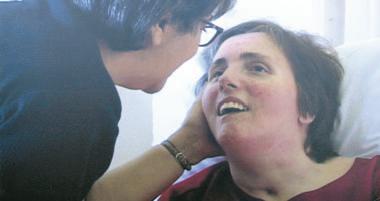
lawyer, David Gibbs, said Bob and Mary Schindler “continue to be hopeful that the court will allow the numerous outstanding legal issues in Terri’s case to be resolved before any action to end their daughter’s life is taken.”
Earlier that day, Pinellas County Circuit Court Judge George W. Greer issued an emergency stay until 5 p.m. on Feb. 23 of a 2nd District Court of Appeals decision clearing the way for Michael Schiavo to order doctors to remove the tube. Michael Schiavo - who remains legally married to Terri Schindler Schiavo but now has two children by another woman -- says his wife would want the feeding tube removed. The Schindlers say their daughter would want to live, in part because of her Catholic beliefs.

February 24, 2005, The Record Page 5
The devil is portrayed in this stained-glass church window. The Legionaries of Christ inaugurated a new course on Satanism and exorcism on Feb. 17 at Regina Apostolorum university in Rome.
The Parish, The Nation, The World
Terry Schiavo with her mother
perspectives
The spiritual vacuum is never empty
A recent survey of 500 people by our morning newspaper and HBF revealed that two-thirds of them never attend church, but 76 per cent of them believe there is some kind of afterlife or spiritual basis for our existence. Most of them know nothing about the afterlife or the spiritual basis for our existence, and most do not do anything to find out about it.
What is really significant about the finding is that even in such a spiritual wasteland, three-quarters of these young people have the natural intuition that they are spiritual as well as physical beings. This is a clear indication that the reality of human spirituality is never far away and is never totally drowned out by the din of an almost exclusively secular consumer society advancing deeper into the culture of death.
Catholics might easily say that these young people are responding to the presence of God within them, and they would be right. When God breathes his life into each one of us, it is a living spirit, and since he has carved each one of us on the palm of his hand, the murmur of God is always in our lives.
But in saying that, Catholics would need to acknowledge that we have learned this understanding from the community we live in – the family, the Church, the people of God. The unspoken awareness comes from God Himself, but the conscious knowing is almost always something shared.
Tel: (08) 9227 7080,
The position these young people find themselves in – and it is fairly obvious that they are representative of our young people – is actually a description of the double failure of our present society in relation to the young.
The first failure, a welcome one, is the fact that a secular, hedonistic society with technological access to the minds of the young every day of the week cannot silence the love of God for his children and the murmur of it in their souls.
The second is the failure of our community to meet the needs of young people for authentic spiritual development. Clearly, they know there is a spiritual basis to their existence, but there is little public community recognition of this reality or of the need to develop this aspect of the human person. Many secularists would no doubt say this failure is an achievement, but they can do so only by ignoring the intuitive awareness of so many people.
For the last 40 years or so, the public expression of our society – parliament, public education, public health, most other public institutions, ‘culture’ in what passes for music, theatre, art and literature, and the means of mass communication have wandered further and further from recognition of our spiritual and moral nature. Like frogs dozing off in gradually warming water, our community has barely noticed the change.
The change, however, has become so deep that when some Christians recently tried to influence the outcome of the Federal election, some commentators became alarmed that Australia’s democratic culture is about to undergo an horrendous change. They are too late; it has already happened.
Nowhere is the change more obvious than in the issues of life. We arrived at the societal suicide stage of failing to reproduce ourselves about 30 years ago. Undeterred, we advanced to the point where the killing of babies in abortion is legal and publicly funded in all States, and we have now entered the twilight world of lunacy where this killing is called reproductive health.
The other great symbol and arrangement of life, marriage, has been so undermined that most people don’t recognise it as having any unique meaning or value. Marriage was commonly understood as the extraordinary gift of God and nature where people become whole through the union of the two halves of humanity; as the union that brings both life and nurture to succeeding generations; and as the opportunity for men and women to develop in all the virtues. Many still hold that understanding, but in the public square, it is all too often, and too foolishly, dismissed as a mere piece of paper. Tragically, it is seen by some (including our Parliaments) not as the origin of children, but as a source of embryos for experimentation.
There may be many explanations for this moral collapse into a culture of death, but the most obvious and the most compelling is the failure of Christianity to maintain any semblance of unity about moral and spiritual truth. It was not this generation that divided Christianity into tens of thousands of parts and fragments, but in the last 75 years large segments of Christianity abandoned most of the revealed and traditional beliefs about the gospel of life. If we cannot agree, can we object that others despair? In times of dire trouble – as in times of peace and joy – there is one course of action, prayer, more prayer, and the joy of prayer.
Greek-Australian visit a delight
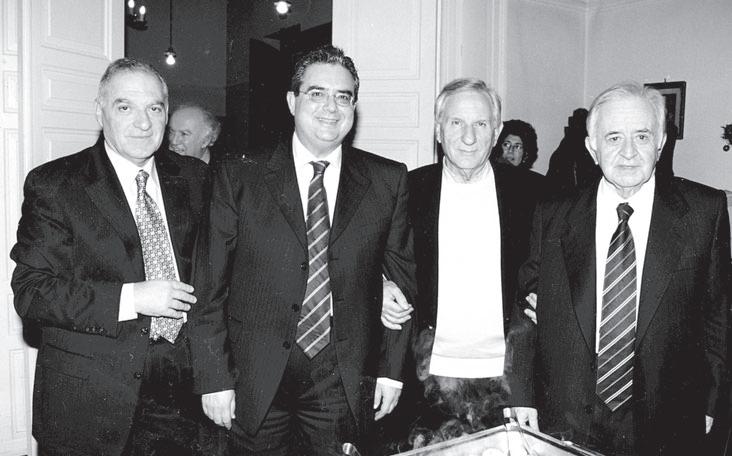
It was with great delight and appreciation that we here in Athens read the report in The Record of July 2004, concerning the completion of the first cycle of exchange visits between theological students of St Charles’ Seminary, Perth and Rizarios Ecclesiastical Academy, Athens.
Please allow me to introduce myself. I am a member of the Board of Rizarios Foundation in Athens and I have been appointed co-ordinator for the program.
I would like to congratulate the exchange Committee in Perth and especially the Rector Monsignor Timothy Corcoran.
The two seminarians Paul Stokes and Clayton Mitchell of St Charles’ Seminary are two remarkable and intelligent young men. They were wholeheartedly welcomed by all our students and faculty. They showed great interest and enthusiasm, modesty and sensitivity and above all, maturity of thought and deep faith. May the Lord bless their hearts and deeds so that they become
letters to the editor


worthy members of the Great Church of our Lord Jesus Christ in the years ahead.
I must also express my deep appreciation and great thanks to the Orthodox teacher Ms Susana Dimitrakos in Perth for her great contribution to the program. Her husband Fr Panayiotis Dimitrakos is a graduate of Rizarios School of 1969, I believe.
Great thanks are also due to Mr Philip Shields for his vision, devotion and dedication to the program. Such programs give to the students and all of us the opportunity:
■ To live the actual life of the host seminary,
■ To experience the academic, social, pastoral life of each as well as their liturgical ways of worshiping,
■ To observe the uniqueness of the Orthodox tradition and
■ To come closer to an understanding between the Greek Orthodox Church with other Christian dogmatic beliefs.
To have such opportunities for students of Rizarios and St
Charles’ to meet face to face, to exchange ideas and experiences, to see other’s preparation for the Holy Priesthood of Our Lord Jesus Christ, I am sure you will agree, is marvelous. Words fail me to express the true feelings of my heart and the deep thoughts of my mind not to mention the great contribution to the realization of this cause by receiving the invitation of The Most Reverend B J Hickey, Archbishop of Perth, the blessings of His Eminence Archbishop Stylianos, The Greek Orthodox Primate of Australia and The Orthodox Primate of Greece, His Beatitude Archbishop Christodoulos of Athens, along with local support from His Grace, Bishop Nikandros.
I look forward to the continuation of this program and its focus on building good, trusting and friendly relationships between Orthodox and Catholic communities.
These enthusiastic young people are the hope for our Churches in future years. To be able to encourage each other in their holy vocation within the Holy Orthodox and the Holy Catholic Faiths is a powerful gesture.
Thus, the spiritual bond will be complete and manifest the full unity of the Body of Christ.
I strongly believe that such contacts and activities fulfill a key meaning of Christianity and encourage the unity of the whole Church, East and West, in Our Lord Jesus Christ.
Tsakiris Panayotis
Educator, M.A. Ed
SPECIAL REPORT: Page 7
It is to be regretted that the author of the article chose to argue “ad hominem” against the Editor of the West, Mr Paul Armstrong.
Childish and disrespectful attempts at humour at the expense of the editor’s name not only further undermine the author’s credibility, they have no place in a Catholic journal. I believe the Editor of the Record and the author of the article (unsigned, unsurprisingly) owe Mr Armstrong an apology.
Spoof was not so smart
Just why your journal has chosen to report on “The West Australian” conducting a phone poll on whether Pope John Paul should resign is not clear – and it remains unclear by the end of your “report”.
If the intention is to suggest that the possibility of a papal resignation is beyond the legitimate boundaries of debate, or that it somehow violates a deeply-held and unchangeable principle or law, then you are misinformed. Should Pope John Paul choose to resign on the grounds of ill-health, that would certainly create a new scenario and raise many new questions – but it would be a perfectly reasonable decision on his part. Debate on the topic is neither good nor bad; to imply that it might indicate disloyalty or infidelity is nonsense.
The Record might be far more gainfully employed in engaging “The West” and other local media on the standards of their own reporting, their often evident bias, and their responsibility to both report and present the truth. Thus The Record might (at last!) catch up with the Vatican Council and engage in a meaningful, educated and ongoing dialogue with the world in which it finds itself. Sadly, we in this city and Archdiocese cannot look to The Record for a mature and theologically literate Catholic journal, able to take on board and debate intelligently the complexities of national and local political, economic, social and religious life – and we are very much the poorer for it.
Wasting space on a completely unnecessary attack on “The West” undermines your credibility, and actually gives oxygen to what is a trivial nonissue.
Michael Leek OSB North Beach
Page 6 February 24, 2005, The Record editorial
Some of those involved in ensuring the success of the exchange visit between Perth and Rizarios: Mr Tsakiris Panayotis, Coordinator, Mr Moraitis, Secretary, Mr Houlis, President of Rizarios, and Rizarios Board member Mr Kitsos.
PO Box 75, Leederville, WA 6902
cathrec@iinet.net.au
Fax: (08) 9227 7087
Letters continued Page 14

Encounter in Greece
With Archbishop Hickey's letter of invitation dated February 5, 2001, the process of developing a program of exchange of theological students between Perth, and Athens, began. 2004 saw the first meeting of students from St Charles Seminary with students of Rizarios Ecclesiastical Academy in Greece. Here Clayton Mitchell and Paul Stokes talk candidly of their meeting with their confreres in Greece.




Vista THURSDAY, FEBRUARY 24, 2005 soon to be on the Web Perth, Western Australia
Easter Sunday - "Anastasi" Metropolitan Dorotheos leads Kur. Argerenia, Fr Spiros, Susana Dimitrakos, Philip Shields, Clayton Mitchell and Paul Stokes to Church on Mykonos for the traditional service called 'Agape'.
Experiencing tradition
Fr Theoklitos is the rector of Rizarios Ecclesiastical School.
During our time in the seminary he was very eager that we immerse ourselves completely in the schools academic and spiritual life. Upon our arrival he introduced us to the assembled students, speaking of the sincere hospitality that the school extended to us.
Our first official meeting with Fr Theoklitos was at his private office. Here he shared some of his hopes for our stay in Rizarios. A prolific writer, he shared with us the working of the Spirit in his life inspiring him to support the exchange. At our request he also offered us his own ideals of priesthood for our future ministry.
During our stay he encouraged us to experience for ourselves the rich tradition and history preserved in the Greek Orthodox Church. This hope was definitely realised.
We spent our first week in classes with the final year students, in the daily routine of the seminary. The following week we participated in Holy Week celebrations. During tile liturgy Fr Theoklitos invited us to the front of the chapel, to

sit at his right hand as privileged guests. We are very grateful to Fr Theoklitos, a concerned educator of young people, and the staff of Rizarios for their hospitality and
encouragement. At our farewell, thanking them for their kindness, we exchanged parting gifts in a sign of our friendship.
Paul Stokes
At home in Greece
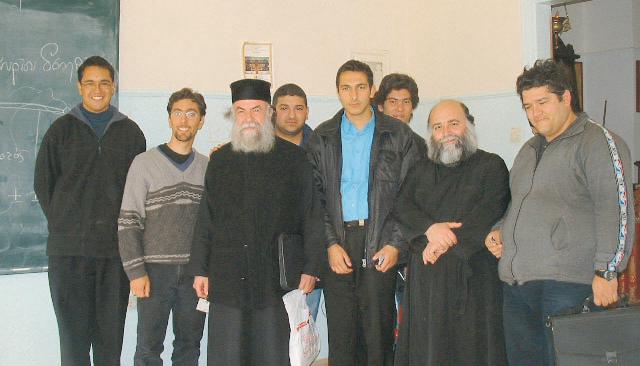
After the school broke for Easter, one of the Greek senior students, Theodoros, invited us to spend a day with him at his home.
Upon our arrival we met his mum and shared with them a meal of her delicious homemade cooking. It was absolutely delicious reflecting her many years of experience in cooking in their island restaurant. After sharing photos and family stories we took in the sights of his town in laid-back Greek style.
Firstly the local Orthodox monastery, followed by coffee at the local Kafeneon. He then called up his friend to drive us to the train. However, they were also out relaxing so instead we joined them. After sharing some of the universal interest of guys all over the world, i.e. fast cars and the latest music, we eventually made our way home after a very enjoyable and relaxing day.
- Paul Stokes
Our common mysteries in faith
At the spiritual heart of Rizarios Academy was their very own Church. It was a most amazing place of worship, every wall was covered with icons, each telling their own story. The Church was in the form of a cross, with a domed vaulted ceiling rising high above in the centre. Looking up inside this dome one came face to face with the giant image of Pantocrator. It was a breathtaking atmosphere, to be surrounded by so many angels and saints in our worship of God. The Holy Week liturgies were a unique opportunity to immerse ourselves in the richness of their religious traditions. They shared many familiar symbols like light, incense, and traditional icons, but each one was used in different ways and communicated its own profound meaning. It was a privilege to join the students as they chanted and prayed, singing and praising God. Each liturgy immersed us in the richness of the sights and sounds of the Greek Orthodox Ceremonies, that speak so powerfully of the mysteries of our common faith.
- Paul
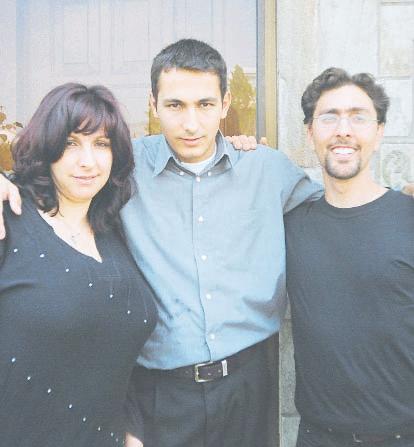
Greek odessey in friendship
The daily life of Greek students
We spent a week in classes with the final year students, though the rector, Fr Theoklitos, wished us to stay longer. They had quite diverse backgrounds including Br Giannis, a monk, a Romanian Priest on a refresher course, and other young men from all around Greece.
We were able to get to know several of the guys better than others, because of their high level of English and our beginning Greek. Christos was inspiring in his gentle and honest nature and his serenity of spirit. Theodoros, familiar with foreigners at his parent’s island restaurant in Lesvos, shared with us his wonderful openness and hospitality. It was great to spend time with them and gain a first hand idea of their daily life and studies. The studies gave us a glimpse of the uniqueness of the Greek learning and knowledge. We discussed the pastoral principles of St John Chrysostomos; explored the link between Church and state and their support for one another (reflected when the Greek Primate
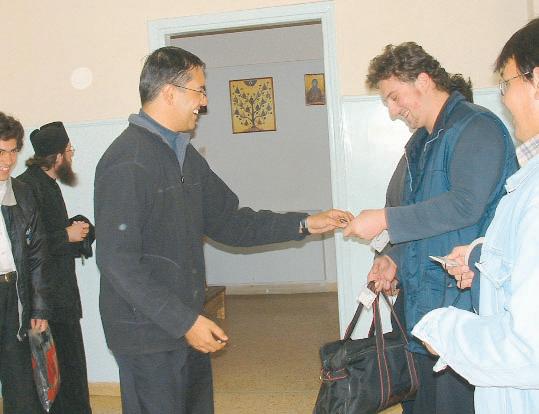
Clayton
presented the medals at the soccer World Cup); and also delved into the magnificence of Byzantine architecture that has assisted hearts and minds to ascend to God
in prayer throughout the ages. At our final class we presented each of the clearly moved students with a polished Iron Ore crucifix from Australia. - Clayton Mitchell
Vibrant memories
Rizarios Ecclesiastical College was a vibrant place to stay. The students followed a long schedule, and worked hard. However, that didn’t stop them having fun, and we shared many fond memories together.
They began each day in the chapel for morning prayer. Then on certain days they gathered outside the school, to raise the Greek flag accompanied by a rousing chorus of the Greek National Anthem. Classes for the day would then start and continue until lunch.
Lunch was interesting because we were there during Sarakosti, or Lent. During our stay there were only vegetarian foods and no oil. The Greeks take their fasting very seriously! Partly because of this, I
We want to return the blessing
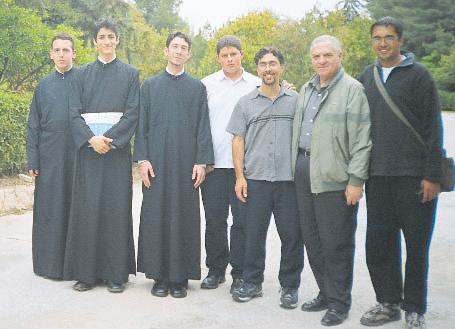
This was an amazing experience for Clayton and me, of which this article reveals but a glimpse. We also experienced much of the culture and history of Greece through the generosity of so many, both inside and outside the seminary, especially during the awesome excursion to the monastic and historical sites in the North of Greece with the Third Lukeio class. In a year’s time we expect two Rizarios students to complete the first exchange cycle by attending St Charles Seminary. We would like to return the blessing that we received.
The Catholic Orthodox Bridge Building Committee (CATCOB) would be grateful to hear expressions of interest from any individuals or groups, both Catholic and Orthodox, who would like to assist these students to experience the culture and faith available in Australia.
Please contact Audrey: 9279 1310, Caroline: 9223 1351, Fr Gerald 9314 7733
Rosaries unite brothers
Clayton Mitchell was indelibly moved by a particular moment, among many warm moments of solidarity and fraternity between the Orthodox and Catholic seminarians.
One evening two rosaries were exchanged between an Orthodox seminarian and him.
- Clayton Mitchell
think, they have developed some delicious fasting foods. I didn’t mind the absence of meat at all. After a siesta break, study would resume until the evening. Between classes the students would chat, share jokes, listen to the walkman or even break into their favourite Byzantine chant. (Inspired by them we jumped at the chance to have several classes of chanting tuition with the affable Mr Zisimos) There was never a dull moment. Before we left we traded Holy cards and other tokens to remember this extraordinary time. We gave a short speech after the final meal, and received boisterous cheers of farewell. Today, many fond memories and friendships remain.
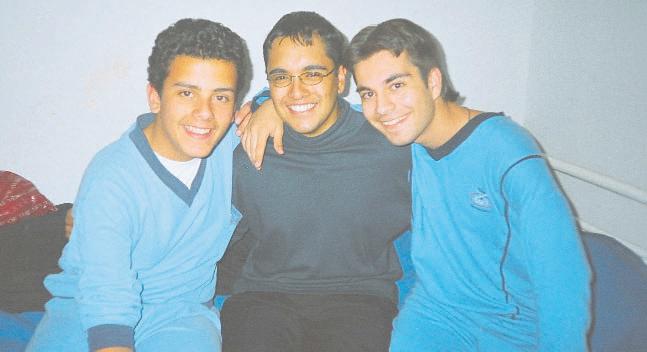
One rosary was the Orthodox beads called the “Komboskeeni” on which is said the traditional Eastern “Jesus” prayer “Lord Jesus, Son of God, have mercy on me a sinner”; the other was Our Lady’s Rosary.
Clayton and Costas had been chatting amiably about simple theological understandings of the Trinity on their way to dinner, and in the middle of the informal conversation, Costas stopped and thoughtfully declared, “....but if we both believe in the same God and he is Father to us both, then that makes us brothers!” Clayton was moved by this.
It was in the days before departure that Costas had been preparing by hand a present for Clayton, the Orthodox rosary beads. In a gesture of profound friendship, these were presented to Clayton and in return Clayton

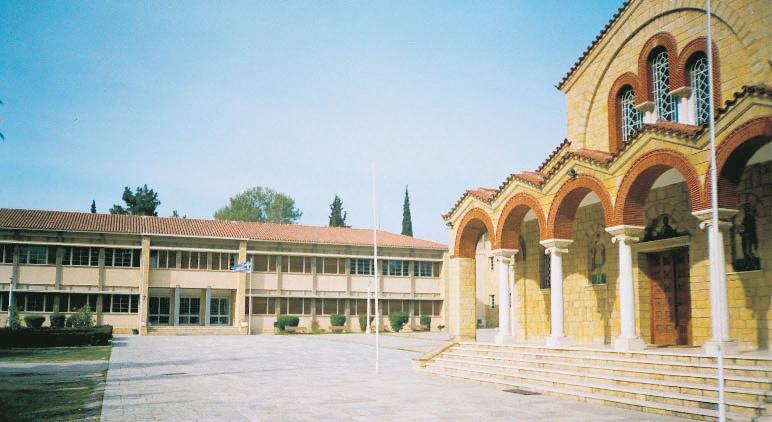
gave the young seminarian, his Rosary. Mr Mitchell said that in these particular moments, the feeling of respect, esteem and love for each other’s faith was unforgettable.
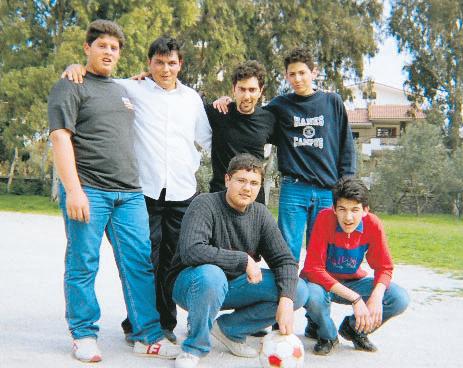
Page 8 February 24, 2005 The Record February 24, 2005 The Record Page 9
Rector of Rizarios, Fr Theoclitos, centre with Program Assistant Philip Shields, Perth Seminarians Paul Stokes, left and Clayton Mitchell at right.
Mitchell presents an iron ore cross to Spiros watched by Aris and
Students from the senior class including Theodoros, with Fr Chrysostomas, the Vice-rector and students from Perth.
"God is our Father and so that makes us brothers" Clayton Mitchell with seminarians Dmitri and Dimitri shortly before departing for Australia.
Stokes
Paul Stokes from St Charles Seminary with Theodoros, final year seminarian at Rizarios and his mother, the day before leaving for Australia.
"Ready for flight to Australia. Rizarios seminarians farewell Aussie students in company of Mr Panayiotis Tsakiris, the Greek Coordinator of the program
Top: The grounds of Rizarios Ecclesiastical Seminary. The Chapel is on the right, and the dormitories and study rooms on the left.
Bottom left: Paul Stokes, centre, with some seminarians after a soccer match at the seminary.
Books for children
 ■ With Guy Crouchback
■ With Guy Crouchback
There has been some controversy lately over “nasty” children’s books, one of the latest of which apparently includes coprophagia and the incineration of a cat. These works have both detractors and defenders, the latter claiming children are encouraged to read by them and do not confuse their contents with what happens in real life.
I am not sure that they do either much harm or much good, except I think it possible that by a sort of Gresham’s Law they drive better, or more substantial, works out of the market.
Of course, some of these more substantial works are not very nice themselves, depending on how the term “nice” is used. I am reminded of a child who once - this is true!
- reviewed the previous night’s television to me as follows: “The movie about vampires was too scary so we watched The Diary of Anne Frank instead.”
I was recently re-reading some of Mary Norton’s Borrowers stories.
The Borrowers, for those who do not know, are tiny people who live furtively under the roofs, behind the wainscoting, etc., of human houses, and “borrow” for their survival all the small things that unaccountably go missing in a house. They are terrified of humans but depend on them. There is no doubt that the Borrowers are a great creation and both narrative and characterisation are excellent. The stories are, however, extraordinarily dark for juvenile reading. The world the Borrowers inhabit is bleak and threatening, with not a moment’s security, and no happy end in it is assured - rather the reverse. The Borrowers themselves can be thoughtless, hypocritical and snobbish, though even the upper-class
Borrowers face starvation and freezing if the humans shut up their part of the house. They seem - a brilliant touch - not to even own their names, which are “borrowed” too, nearly human but not quitePod, Hendreary, Homily, Eggletina etc. However, like all good literature, the Borrowers stories tend to enrich the reader’s moral universe rather than impoverish it.
Mary Norton, incidentally, also wrote Bedknobs and Broomsticks. I have only seen the Disney film of this, not read the book, but I think it possible the film made some changes.
“The movie about vampires was too scary so we watched The Diary of Anne Frank instead.”
A late Borrowers story, originally published in 1966, is Poor Stainless, a rather slight tale, and by no means the best, of only 52 pages. To bulk out the book, however, the publishers, Viking, have added another, nearly but not quite Borrowers, story, Paul’s Tale, of about 25 pages. This, although very little happens in it, apart from subtly exploring the borderland between fiction and reality, and of the contrast between the cliched and the original, is almost comparable to Lord of the Flies as an horrific picture of the natural, instinctive cruelty of children, with the adult perhaps a bit better thanks to the pressures of civilisation’s conventions but not enormously so. In theological terms it can be seen, like Lord of the Flies, as an affirmation of the presence of Original Sin. The illustrations, though I would ordinarily call them not exceptional, somehow set it off perfectly (and is that a stylised Crown of Thorns?).
Paul’s Tale is an unsettling confrontation with cruelty and callousness - with evil - disguised as a whimsical and superficially happy child’s fantasy. But the child who reads it may gain something in the way of moral education that the child whose reading is confined to comic “nasties” will not.
diversity matters
(contemporary human mobility and the stand of the Church)
The Church on the move
■ With Tony Paganoni, CS
If migrants are now starting to be seen as a spiritual resource for the Church, and if migration is viewed as a blessing rather than a nuisance for the receiving society, then it is time for a new spirit to prevail in the host churches. Far too often in the past migrants have been merely tolerated or regarded as perpetual beneficiaries of social services. Their status has almost always been equated to that of the poor and needy. But as some local churches have come to understand, there must be a conversion of the heart.
Speaking about ethnic ministries, the Italian Bishops state, A community is truly Catholic, not only when it attempts to solve (migrant) problems, but above all when it recognizes and cherishes the religious and cultural heritage of other churches in a spirit of communion.
(Evangelization and Charity, 8.12.1990).
Iustitia et Pax in Rome is even more explicit,
It is the way that we look at the other that needs purification. To foster thoughts and racist attitudes is an evil which is clearly at variance with the message of Christ. According to Him, the ‘neighbour’ is not only the human being belonging to the same tribe, country or religion: it is everyone I meet during my life journey.
(The Church and Racism, 3.11.1988).
The call for new attitudes to emerge in the Churches has been issued frequently and at different levels – it would be too boring and repetitious to cite the sources. The Pope and Bishops of various countries have reiterated the principle that the linguistic, religious and cultural heritage of migrants and minority groups is to be regarded as a precious resource to be conserved at all costs. Increasingly the concept of rights rather than favours for migrants is taking hold, requiring an appropriate pastoral sensitivity to uphold the right for their cultural diversity to be maintained and celebrated within the overall communion of the Universal Church.
It is a cop-out for Church
Baby boy survived three abortion attempts
■ By Steven Ertelt
Manchester, England (LifeNews. com) - A baby in the U.K. survived three failed abortion attempts and was born alive at 24 weeks into the pregnancy. The baby boy was born at a local hospital after his mother changed her mind about the lateterm abortion.
Although the mother had been told at an abortion business that the RU 486 abortion was complete, she felt the baby moving on the way home.
Only coming to light now, two years after the failed abortions, the baby boy is healthy and is one of the few survivors of an abortion and premature birth to remain alive. His story has been documented recently in the Journal of Obstetrics
and Gynecology. The baby was on a ventilator for seven weeks and fought off life-threatening infections to survive.
He had a serious lung disease for the first six months of his life and was finally able to go home after seven months of treatment in the hospital.
Dr Paul Clarke, one of the report’s authors and the baby’s doctor at Hope Hospital, told the Times, “This mother went through extreme hardship waiting to see if her baby was going to make it. She was told to expect him to die so many times. I am full of admiration for her.”
A report in the London Times says the mother did not realize she was pregnant until 22 weeks into the pregnancy.
Already the mother of one, she felt
authorities to insist that migrants’ rights should be safeguarded by civil authorities and governments. It is within the Church that the lesson must be acted upon. To get the concepts and action right, words such as integration and assimilation which are often used to legitimise enforced inclusion probably need to be dropped, according to Pastoralis Migratorum Cura. The migrant has rights in the religious sphere too! In this regard, the danger of forming ‘parallel churches’ within the same diocese or territory has often been cited as a deterrent. The flexibility demonstrated by the American bishops in the latter half of the 19th and throughout the 20th century in overseeing dioceses with a vast network of multiple national parishes (Polish, German, Irish, Italian etc…) gives the lie to this claim.
A community is truly Catholic, not only when it attempts to solve (migrant) problems, but above all when it recognizes and cherishes the religious and cultural heritage of other churches in a spirit of communion.
Apart from the conventional territorial parish defined by geographical boundaries, special parishes were created for members of a particular language and cultural group. This was possible because large numbers of clergy and religious came over with their own people. Thus a large diocese in the USA would consist of a veritable mosaic of territorial and national parishes under the jurisdiction of the bishop, reflecting the “E pluribus unum” ideal of the nation. The immigrants came to regard the national parish as “their own”. This flexible solution represented a happy compromise between the need to develop a formula acceptable to the bishops demanding ‘Americanization’
and the natural desire of the immigrants to preserve their own language and traditions.
In no way am I suggesting that national parishes should be promoted in Australia. The world has turned and times have changed. Today the newer migrant communities in Australia mostly come from countries where scarcity of clerical and religious personnel is the rule.
All I am claiming is that flexible thinking and pastoral practice at that time brought about a successful experiment in the integration of culturally diverse immigrant groups, which triggered an amazing growth and vitality within American Catholicism, creating parishes, schools, hospitals and other institutions reflecting the many cultural traditions and lifestyles of their countries of origin. But sadly, the variety of ethnic congregations within the American Church came to be viewed as a threat to unity, as unAmerican or a needless complication. And in Australia, despite some urging by pastoral workers, the diversifying of pastoral strategies as developed in the USA was never given a chance.
In the early 1950s, the Australian Catholic Bishops formally rejected the national parish experiment as obsolete and inapplicable to Australian conditions. In so doing they deprived Australian catholic communities of a possible option which over time, would have brought about a very different outlook.
American historians are currently rediscovering the connection between the American Catholic Church and the waves of different migrant groups. In rejecting the idea of a hasty assimilation, Church leaders opted for a benign application of cultural pluralism. Appreciating that the newcomers’ language and culture were essential to the preservation of their faith, Catholic leaders were loath to urge rapid integration lest immigrants be lost to the Church.
This is the very dilemma faced by leaders in the Australian Church at the moment: either welcome and cultivate an appreciation of diversity, or else see it absorbed by Australian secular institutions and lost.
she could not handle caring for a second child.
She was given the dangerous RU 486 abortion drugs over a series of four days at the abortion facility run by the British Pregnancy Advisory Service.
The abortion drug is not supposed to be used so late in pregnancy.
The abortion business is under investigation by British officials for sending women to Spain for illegal late-term abortions and falsifying medical information.
Dr. Clarke’s article calls for further investigation into the performance of late-term abortions and decries the lack of medical care available at abortion businesses to treat newborns who survive failed abortion attempts.
- Lifenews.com
Archbishop reminds Minister on embryos
Continued from page 1 Minister for the Ageing, that if the relevant part of the review could not be completed by April 5, it was still open to Parliament to amend the repeal provision (Part 5 Division 1) to ensure that the protection remained in place until the review was completed and Parliament had considered it. Alternatively, he asked the Minister to use regulation or policy directive to limit the National Health and Medical Research Council to issuing licences only for pre-
2002 embryos until the review had been completed and considered.
“It would be embarrassing to the Government and distressing to many, many citizens if the review determined that the protection of human embryos should be maintained or extended, only to find that it had been unnecessarily abandoned altogether,” he told her.
He asked both Ms Bishop and Mr Beazley to do their utmost to correct the unfortunate situation that had developed.
Page 10 February 24, 2005, The Record
i say, i say
Passing through the eye of a needle
■ Dr Andrew Thomas Kania
At the climax of the film, Indiana Jones and the Last Crusade, the hero and his entourage, defeat the villains at the cave city of Petra in Jordan. Aside from being the most likely place that the Magi were able to purchase gifts of gold, frankincense and myrrh en route to Bethlehem, Petra appears covertly in the New Testament by way of analogy in a teaching issued by Christ regarding wealth. Approached by a rich young man as to what was necessary to enter the Kingdom of Heaven, the Gospel of Matthew has Christ instructing his followers: “’Again I tell you, it is easier for a camel to go through the eye of a needle than for someone who is rich to enter the kingdom of God.’”
(Matthew 19: 24, NRSV)
The common error for those who read this passage, is twofold: first, that Christ is alluding to a camel passing through a hole the size of a sewing needle’s eye; second, that wealth is in some way the arbitrary licence for damnation. With regard the first case, “the eye of a needle” is in fact a geographic location, an extremely narrow canyon entry to Petra, that caravans passed through in order to travel to this ancient and wealthy trade city and so arrive at its grand Treasury building.
Second, with regard riches, the actual acquisition of wealth is not in itself sinful, as benefactors, philanthropists, bursaries, and such like testify. The Dominican mystic Eckhart also reminds us that there is no more sin in a bar of gold, or a diamond ring, then in a bucket of mud. But it is the distorted view that wealth may give us of ourselves and others, that quite often does lead to sin. Moreover it is a poor theologian who claims that there is something intrinsically redemptive in seeing your children hungry, your wife despairing, your family cold, the bills for everyday needs insurmountable.

In Charles Dickens’ tale, A Christmas Carol, the nineteenth century English novelist, has the central character, Ebenezer Scrooge, learn the following lesson from one of this ghostly guides: "There are some upon this earth of yours," returned the Spirit, "who lay claim to know us, and who do their deeds of passion, pride, ill-will, hatred, envy, bigotry, and selfishness in our name, who are as strange to us and all out kith and kin, as if they had never lived.
project compassion: third Sunday
Remember that, and charge their doings on themselves, not us."
Dickens’ novel concentrates on an all too familiar and sad character, the individual who has become so wealthy in temporal matters that they are now larger not only than their own life, but also with regard the lives and needs of their fellow human beings. Wealth does lead to pride, when comparisons are drawn by what material wealth we have, and what others do not have; wealth does lead to selfish-
ness, when in order to gain temporal goods, we forgo compassion for our neighbour, or time spent in loving others, especially our families; wealth does lead to avarice when in order to satisfy our wants, we supplement honest earnings with ill-gotten coin; wealth does lead to bigotry, when once attained, we wish to keep distant from those not in our ‘class’, who may remind us of where we have come from, or where we don’t ever want to be.
Power, wealth, and prestige, have the innate ability to delude people that somehow mortality travels slower on an expensive time piece. It is this delusion that life will never come to an end, or that immortality can be bought, that too often induces the wealthy to treat those less temporally wellendowed with disdain.
In Paul the Sixth’s encyclical of 1967, Populorum Progressio, succinct mention was made of the ‘problem of wealth’: “But the acquiring of temporal goods can lead to greed, to the insatiable desire for more, and can make increased power a tempting objective. Individuals, families, and nations can be overcome by avarice, be they poor or rich, and all can fall victim to a stifling materialism”.
The point of Christ’s “eye of the needle” teaching is not that the wealthy will be forbidden entry into the Kingdom of Heaven, but that all material possessions will count as nought; the teaching asks the individual to place all things temporal in their true perspective.
It is therefore better for those with material wealth to live as if they had no temporal treasures, than to have lived at the cost of their spirits; at the cost of what God requires of us for His own sake and for the sake of our neighbours. One can be a Christian and be wealthy in temporal matters; but one cannot be a Christian and ignore the sufferings of others, as one can no more be a Christian and treat others as play-things with injustice at the work-place, or from
Sudan continues its crises
Fatma is a widow. She has lived in a displacement camp in Nertiti, Sudan with her seven children since militia kidnapped her husband and burnt their village to the ground in May 2004.
The crisis in Darfur began in early 2003 and there are now more than 1.2 million Sudanese people who have been displaced due to violent assaults by Arab militia on African tribes from western Sudan.
It is estimated that one million are internally displaced and that around 200,000 people have fled to neighbouring Chad, where Caritas is providing assistance to refugees.
Fatma has received supplies of grain, oil and porridge to mix with water. Living conditions are abysmal with families averaging seven or eight people crammed into huts scarcely bigger than two metres in diameter. People are dying from
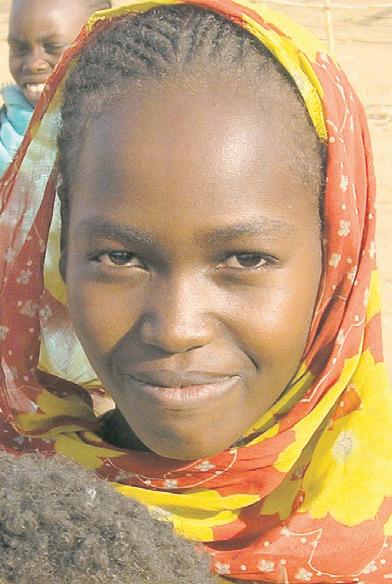
hunger, malnutrition, dehydration and measles. Nertiti is a poor town which lies
on the eastern tip of West Darfur.
Originally home to 7,000 residents it now hosts around 35,000 displaced people. Two camps have been established on either side of the town.
Life in the camps is difficult but people feel safe being there in large numbers.
One month after moving to the camp, Fatma’s shoulder was dislocated after she was kicked and beaten by militia while gathering wood and grass to create a shelter for her family to protect them during the wet season.
The huts are built from grass collected from near the camp where the militia stalk the area and the journey to collect them is a dangerous seven-hour return trip. Every day women risk rape and attack by venturing to the area. However, there are few alternatives when they need to build shelter.
the judicial bar, or across the legislator’s bench. True, Saints have worn kingly crowns, or chains of office, or scholarly gowns, or knightly titles, but these Saints have never lost sight that the God who empowers all, chose not only to be born poor, but born even to the meanest of circumstances.
Those with surplus wealth should not despise their state, but rejoice that through their honest labour they have more than they need. From this point onward, prudence is required on the part of the wealthy, in order for the common good to be nurtured.
Threading the eye of the needle should therefore not be a task arduous. It is a matter of being able to open one’s eyes to the plight of others, and one’s being to the experience of God; it is as much a social question as it is a personal one. We must never forget that the Treasury which awaits us in Heaven contains riches far more sublime and eternal than those the ancient traders to Petra expected; or than those which people today sell their souls and integrity in order to obtain. Chrysostom’s fourth century exhortation resounds with as much immediacy for us, as it did for the audience in his Age: “Remember how we have been created. All the human beings have a common ancestor. Thus all human flesh has the same substance; there is no difference between the flesh of noble-men and that of peasants. When we commit an act of charity, in which we use our excess wealth to help someone with too little, we are acknowledging our unity with others. After all, the rich and poor have the same flesh, the hunger of the poor should cause pain to the rich; and pain can only be soothed through assuaging that hunger”. The eye of the needle has been placed before us, it is only a matter of desiring with heart, soul and mind to enter.
Dr Kania is Director of Spirituality at Aquinas College.
Phone results in!
When the rainy season arrived precious existing water sources became contaminated with human and animal waste.
A joint 18-month appeal involving Caritas Internationalis and Action by Churches Together (ACT) International was launched in July 2004 to respond to the ongoing humanitarian emergency work in Sudan’s Darfur Province.
The joint Caritas/ACT appeal aims to raise $US18 million which will be used to provide food, shelter, medical supplies, clean water and sanitation to 500,000 displaced Sudanese now living in camps and host communities.
Your donation to Project Compassion enables Caritas Australia to respond to emergencies when they happen such as the crisis in Sudan and allows women like Fatma to hope for a more peaceful future.
Aunts and uncles around Western Australia were inundated with telephone calls from nieces and nephews over the last week to register their vote in the Record phone poll announced in last Thursday’s edition of the paper.
Unfortunately, results were blurred by a number of phone calls which turned out to be wrong numbers from telemarketing call centres in India.
Three calls to Aunties also turned out to be reminder calls to put the milk out for the cat or to dust the raffiawork thingy on top of the television that has been there since Uncle George put his pliers on top of it.
One Auntie told The Record she was amazed at the response. “Do you know how hard it is to get calls from nieces and nephews these days?” she asked. “I bless the brilliant editor, the even more billiant prufereader, and the nice boys and girls who work at The Record.”
The Yes case swamped the No case by a massive 30% - three votes to two.
Page 11 February 24, 2005, The Record
A child from Sudan. Photo: Caritas Internationalis
"The eye of the needle." An extremely narrow canyon entry to Petra, Jordan that caravans passed through in oder to travel during ancient times.
THE WORLD
Most US dioceses comply
New audit finds near-total compliance with policies on sex abuse
An independent audit released Feb. 18 in Washington reported that 96 percent of the 195 U.S. dioceses and Eastern-rite eparchies were implementing every applicable article of the U.S. bishops’ policies to prevent clergy sex abuse of minors as of December 31.
Despite the almost-total compliance, “continued external oversight and evaluation (are) essential” since compliance “may improve or diminish over time,” said the audit report for 2004 prepared by the bishops’ Office of Child and Youth Protection.
An audit “does not ensure that all offenders or potential offenders have been appropriately removed from ministry,” it added.
The 50-page report said that in 2004 there were 1,092 new allegations of child sex abuse made against 756 diocesan and religious priests and deacons, with most of the alleged abuse taking place in 1965-74. It said 73 percent of the accused, prior to the allegation, had been removed from ministry or were dead or missing. No breakdown of priests and deacons was given.
Half of the new allegations were against clergy who had been previously accused. Males accounted for 78 percent of the 1,083 accusers.
During 2004, the U.S. church spent $158 million for sex abuse related activities, with more than $106 million paid in settlements to victims, the report said. The figures include money spent by religious orders. When added to other published figures,
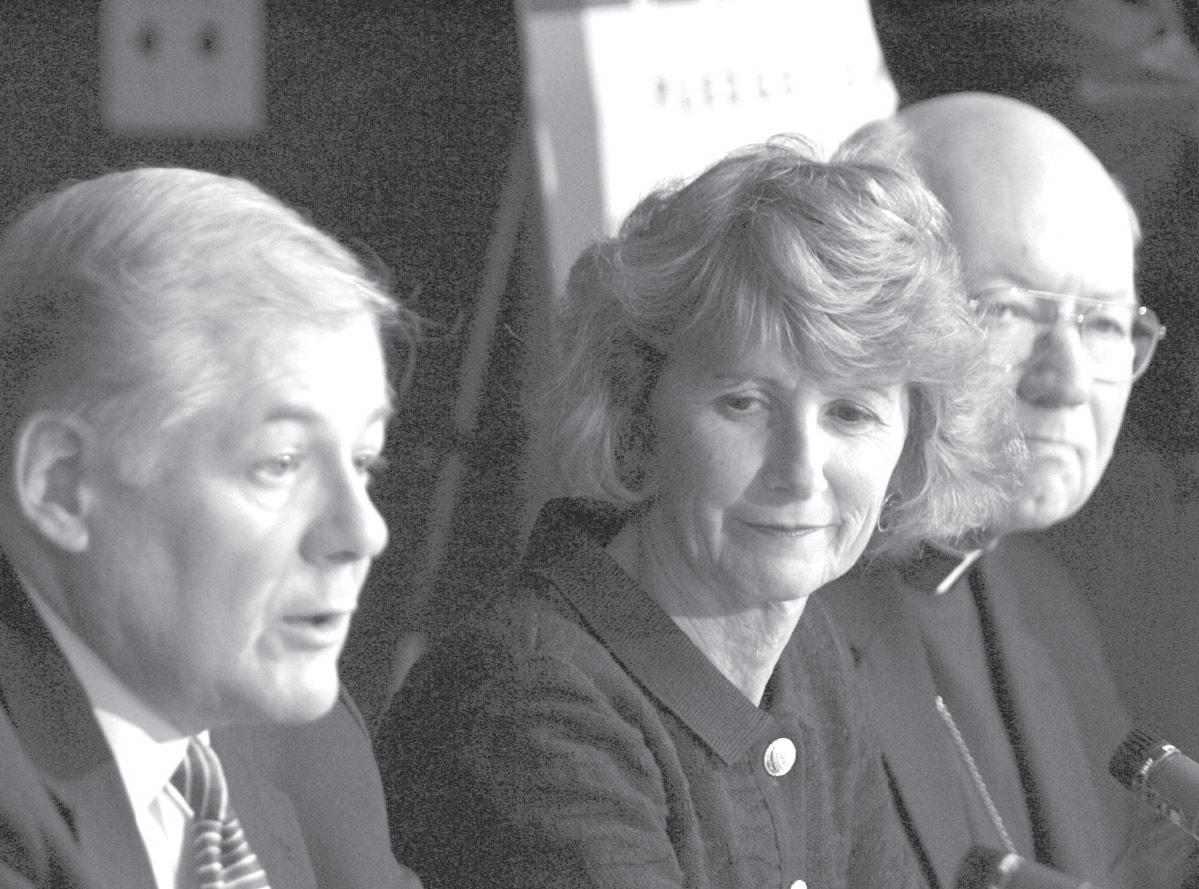
the U.S. church has now spent about $1 billion in child sex abuse related costs since the beginning of 1950.
The statistics are contained in the 2004 annual report on the implementation of the “Charter for the Protection of Children and Young People”; the report was released at a press conference at the National Press Club. The child protection office prepared the report for the U.S. Conference of Catholic Bishops and the National Review Board, appointed by the bishops to monitor compliance with the charter. The all-lay
review board approved the report before it was sent to the USCCB.
The charter was approved by the bishops in 2002 and calls for an annual compliance report.
“There is undoubtedly progress still to be made,” said Bishop William S Skylstad of Spokane, Wash., USCCB president, in a cover letter to the report.
“Much of what dioceses face today is the result of past abusive behaviour -- often long past -- and procedures are in place to deal with and put a stop to new instances
Movement founder dies, age 82
MILAN, Italy (CNS)
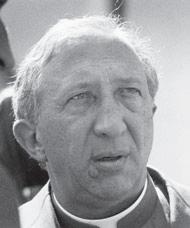
- Msgr. Luigi Giussani, 82, founder and spiritual guide of the Communion and Liberation movement, died on February 22 at his home in Milan.
The international headquarters of Communion and Liberation in Milan said the monsignor died of complications from pneumonia. His body was to lie in the chapel of Milan’s Institute of the Sacred Heart until February 24, when his funeral was to be celebrated in the Milan cathedral.
The Vatican announced on February 22 that Pope John Paul II had asked Cardinal Joseph Ratzinger, prefect of the Congregation for the Doctrine of the Faith, to preside in his name at Msgr. Giussani’s funeral.
Born in 1922 in Desio, near Milan, Luigi Giussani entered the archdiocesan seminary and was ordained to the priesthood in 1945.
Music, literature, art and culture and their interaction with
of abuse that may be reported,” he said.
At a news conference releasing the report, Kathleen McChesney, executive director of the child protection office, said that only 22 of the allegations reported in 2004 were made by boys and girls still under the age of 18 and each of those cases was reported to law enforcement officials.
The number of sex abuse incidents seems to be diminishing, she said, noting that many of the allegations concerned events that took place in the period from 1965 to 1974.
There were 148 clergy dismissed from ministry in 2004 because of allegations made during the year or before 2004, she said.
Also, 305 clergy were temporarily removed from ministry pending resolution of their cases because of allegations made during or before 2004, but some of these cases would overlap with the cases of 148 already dismissed from ministry, said McChesney.
“We know that the crisis is not over because over 300 reports received in 2004 identified alleged abusers not previously known,” she said. The data on new allegations and spending came from a separately commissioned study done by the Centre for Applied Research in the Apostolate, known as CARA and based at Georgetown University in Washington, and incorporated into the final report by the bishops’ child protection office.
The report also includes recommendations for improving policies. These include developing a mediation system for the resolution of allegations and an annual report by each diocese and eparchy with information about new allegations and costs. -CNS
Back on the road for JPII
■ By John Thavis
"A small but fast-growing group of teenagers
"A small but group of teenagers began meeting with him to discuss ways to meeting with him to discuss ways to live their faith."
religious faith were the constant focus of his studies, his writing and his discussions with young people.
Initially assigned to teach at the archdiocesan seminary in Venegono, in 1954 he began teaching religion at the Berchet classical high school in Milan. A small but fast-growing group of teenagers began meeting with him to discuss ways to live their faith.
Although the group began as part of the Catholic Action youth movement, it soon developed its own special focus and format, which was confirmed in 1959 when Msgr. Giussani published guidelines for the groups, which had already begun to spread throughout Milan and to other cities.
In 1969, it was given the name Communion and Liberation and began involving university students and young adults in its weekly catechesis, known as Schools of Community.
Then, as today, the groups
had no formal membership requirements or rolls. The Milan headquarters estimates there are about 100,000 people involved in Communion and Liberation in Italy and several thousand more people around the world.
The young adults who want to make a more formal commitment to the ideals of Communion and Liberation and to its charitable works become members of the Fraternity of Communion and Liberation.
From 1964 to 1990, Msgr. Giussani was a professor of theology at the Catholic University of the Sacred Heart in Milan.
In addition to hundreds of essays and magazine articles, Msgr. Giussani was the author of numerous books, including a study of Protestantism in the United States. From 1997 until his death, he also served as director of a series of recordings of classical music with listening guides published internationally by Deutsche Grammophon under the title “Spirito Gentil.”
As Pope John Paul II continued to recover from a 10-day hospitalization for breathing problems, he faced an increasingly heavy schedule of events planned before his illness.
Vatican officials have not said whether the 84-year-old pontiff would cut back on his schedule, but already he has skipped some events and has been replaced in others.
Privately, some at the Vatican questioned whether the Pope would be up to the physically demanding series of Holy Week and Easter liturgies in late March.
Sources said the Pope did not attend the daily sessions of his February 1319 Lenten retreat; instead, he may have followed the proceedings via a video link from his apartment. He held no other announced meetings during the week.
Dr. Rodolfo Proietti, who treated him for a flu-related throat inflammation and spasms at Rome’s Gemelli Hospital, told a Rome newspaper on February 16 that even after his release the Pope needed more time to recover fully.
The Vatican press office released no information about the Pope’s condition after his release from the hospital. Because his Lenten retreat was considered a private event, the press
office would not say anything about that, either.
The Pope made a brief appearance at his apartment window on February 13 to bless the crowd, but an aide read his talk for him.
In the midst of the uncertainty, one optimistic sign was that the Vatican announced on February 18 the Pope would pay a formal visit to Italian President Azeglio Ciampi at his official residence in Rome on April 29.
In the meantime, other top Vatican officials stepped in for what routinely have been papal duties. Cardinal Angelo Sodano, Vatican secretary of state, was to celebrate Mass at the close of the papal retreat on February 19; Vatican officials and employees were invited.
Messages and letters not requiring the Pope’s attention have increasingly shifted to aides. Cardinal Sodano, for example, sent a message marking the 25th anniversary of the Sahel Foundation, an agency founded by the Pope.
On February 18, Vatican sources were unsure whether the Pope would be well enough to meet with Croatia’s prime minister on February 22, as had been planned. If not, that might fall to Cardinal Sodano, too, as did a meeting earlier in the month with Condoleezza Rice, U.S. secretary of state.
-CNS
Page 12 February 24, 2005, The Record
Church officials answer reporters’ questions on clergy sex abuse during a press conference to release the second report on implementation of the “Charter for the Protection of Children and Young People”. Photo:CNS
Msgr Luigi Giussani



Religious freedom at risk in Canada
Canadian cardinal says same-sex law could affect religious freedom
■ By Deborah Gyapong
A Canadian cardinal said he is concerned about the impact that proposed same-sex marriage legislation could have on the future of religious freedom.
Cardinal Marc Ouellet of Quebec also said that by promoting same-sex marriage the Canadian government is “sowing confusion” and bringing “deep division to society on the basis of a supposed right.”
In a telephone interview from Quebec City on February 17, the day after Prime Minister Paul Martin began debate on Bill C38 in the House of Commons, Cardinal Ouellet said same-sex marriage discards the basic fact “that a man is a man and a woman is a woman, and their union is marriage.”
“There is a sort of abusive interpretation of discrimination and the fundamental right to marriage,” he said.
“If you take (conjugality) out, you don’t have marriage. You have something else. You have a generic sort of union, but you don’t have marriage,” he said.

Cardinal Ouellet warned that the state is advocating something that is contrary to the natural order of things, and in doing so its leaders are falling into “subjectivism” and “everything becomes arbitrary and you have no foundations for civil rights or civil marriage.”
“If the words can be twisted in this way, so religious freedom, too, or any other thing can be twisted in any way according to the arbitrary power of pressure groups,” he said.
“It will divide the country deeply and for a long time, and it will put religious freedom under
attack in the very near future,” he said.
Cardinal Ouellet predicted that once the groups wanting this change get state recognition for same-sex marriage, the next step will be to force the churches to recognize and to bless those unions.
“If they bring me to the court because I am teaching against homosexuality as part of the doctrine of the Catholic Church, I will be accused of homophobia,” he said. “Those things are very serious, and it’s on the way. We are very concerned, very concerned with the future.”
Martin’s speech narrowly framed religious freedom in terms of the rights of religious officials to refuse to perform same-sex marriages, but Cardinal Ouellet said that religious freedom means far more than merely what happens inside a church during a wedding.
He raised concerns about religious groups having to allow their churches or other buildings to be used for same-sex marriage celebrations and that groups opposing same-sex marriage risk having their charitable status removed. -CNS
Stone coffin may be St Paul's resting place
Vatican archeologists believe that they have identified the tomb of St Paul in Rome's St Paul Outside the Walls basilica, following the discovery of a stone coffin during excavations carried out over the past three years.
Catholic World News reports that a sarcophagus - or stone coffin - which may contain the remains of St Paul has been identified in the basilica, according to Giorgio Filippi, a archeology specialist with the Vatican Museums.
“The tomb that we discovered is the one that the Popes and the Emperor Theodosius (379- 395) saved and presented to the whole world as being the tomb of the
around the world
Archbishop named
Archeologists discover what they believe might be St Paul's tomb
apostle,” Filippi reports.
The discovery was made by a team composed exclusively of experts from the Vatican Museum. They had undertaken their exploration in response to a request from the administrator of St. Paul's basilica, Archbishop Francesco Gioia.
During the Jubilee Year 2000, the archbishop noticed that thousands of pilgrims were inquiring about the location of St. Paul's tomb.
The excavation effort was
Pope John Paul II appointed Bishop Joseph Ngo Quang Kiet as the new archbishop of Hanoi, Vietnam.
Archbishop Kiet, who has served as apostolic administrator of Hanoi since 2003, replaces 85-year-old Cardinal Paul Joseph Pham Dinh Tung, the Vatican said on Feb. 21. Archbishop Kiet, 52, has served as bishop of Lang Son and Cao Bang since 1999. The Pope also named Father Francois Xavier Le Van Hong as auxiliary bishop of Hue. Though Vietnam recently passed a law recognizing the right to religious freedom, the government still maintains strict controls
guided by 19th-century plans for the basilica, which was largely rebuilt after a devastating fire in 1823.
An initial survey enabled archeologists to reconstruct the shape of the original basilica, built early in the 4th century.
A second excavation, under the main altar of the basilica, brought the Vatican team to the sarcophagus, which was located on what would have been ground level for the original 4th-century building.
The Vatican archeologist said
over religious groups and their activities, including the Catholic Church. The government must approve the appointment of Catholic bishops and the ordination of priests, said a Vatican official.
Shooter surrenders
A suspect in the murder of a US nun in rural Brazil last week surrendered to police at the weekend.
Sr Dorothy Stang of the Sisters of Notre Dame de Namur was born in the United States but became a naturalised Brazilian. She had lived near the town of Anapu for more than 20 years and worked in advocacy to protect the rainforest and peasant workers before she was shot to death earlier this month. Officials have linked her brutal murder to her advocacy work.
that Church officials would now have to decide whether to undertake further explorations around the tomb, to make the sarcophagus more visible.
In St. Peter's Basilica, excavations that were begun in June 1939 finally uncovered the tomb of the first Pope in 1941.
But it was 35 more years before the Church officially attested to the authenticity of those remains, in a statement released by Pope Paul VI in June 1976.
A similar span of years could elapse before the Church confirms that the tomb discovered in St. Paul's Basilica is truly that of the apostle.
Amair Freijoli da Cunha turned himself in last Saturday. Police allege he was the middleman who hired two gunmen to kill the 73-year-old nun. Police allege that rancher Vitamiro Goncalves Moura was the one who ordered the murder. But da Cunha denied that Moura was involved.
The search is still on for suspected gunman, Rayfran das Neves Sales, who was identified by witnesses. Federal police believe he and the second gunman are hiding in the dense forest.
Health not the be all
While everyone has “a moral duty” to maintain their health, there are limits to the right to pursue physical well-being, according to the head of the Pontifical Academy for Life, Bishop Elio Sgreccia.
Rumour sparks rampage
The papal nuncio to Israel assured Christian residents of theGalilee town of Maghar that the Vatican would continue to keep an eye on their situation following violent attacks against them by their Druze neighbours.
“The Pope as well as myself, the authorities of all the Christian churches worldwide, and all the world will fix a watchful eye on Maghar, to check that the dignity and the safety of the Christians and of the whole population in the village be respected and protected,” the nuncio, Archbishop Pietro Sambi, said at a special Mass in the village’s Melkite Catholic churchon February 20.
In the homily at the Mass, Latin Patriarch Michel Sabbah of Jerusalem said that love, not revenge, should prevail. He called for community efforts to resume good relations among all the villagers by creating feelings of deep respect and rejecting stereotypes spread by rumours.
The violence reached its peak a week earlier when thousands of Druze in Maghar - a mixed Druze, Muslim and Christian town of some 18,000 residents - attacked the Christian neighbourhood, burning cars, homes and businesses after a rumour was spread that a Christian youth had posted a photomontage of naked Druze girls on the Internet. A police investigation later revealed that no such photographs existed and that the rumour was spread by a Druze teen.
The Druze, a religious sect, broke off from Islam early in the 11th century.
The Christians, who represent about 15 percent of the population of the village and are all Melkite Catholic, fled their homes and have not yet returned.
“I am fully aware of the consternation and the terror filling the hearts of the Christians who were compelled to flee,” said Archbishop Sambi. “Nevertheless, I invite them today to recover courage and come back to their community and to their town."
Health, when defined as complete physical, mental and social well-being, has led to a “hedonistic” sense of well-being that can put the lives of the defenceless at risk, he said.
“Just think that, using the health of the woman as its motive, abortion was legalized,” he said. “So-called reproductive health involves abortion, sterilization and emergency contraception,” he added.
The bishop’s comments came ahead of this week’s meeting sponsored by the Vatican academy that was set to address the ethical definitions of “quality of life” and “health”. Bishop Sgreccia said a sense for the sacredness of life is lost when expectations of what constitutes a decent quality of life are too high or too Utopian.
-CNS
-CNS
Page 13
Canadian Prime Minister Paul Martin is applauded during a debate on samesex marriage legislation. Martin, a Catholic, supports the legislation.
Photo: CNS
To serve the truth
Pope says Catholics must learn to use media to promote truth
■ By Cindy Wooden
Catholics must not be afraid of the communications media, but must learn to use them to promote the truth and must speak out when the media distort the truth, Pope John Paul II said.
Modern media are instruments “God has placed at our disposal to discover, to use and to make known the truth, including the truth about our dignity and about our destiny as his children,” the Pope said in a letter to communicators.
The Pope’s apostolic letter, “The Rapid Development,” was addressed to “those responsible for communications” and was released on February 21 at a Vatican press conference.
In addition to looking at the way Catholics can and must use the media and interact with them, Pope John Paul called for greater public involvement in the running of newspapers, television and radio stations.
“If the communications media are a good destined for all humanity, then ever-new means must be found - including recourse to opportune legislative measures - to make possible a true participation in their management by all,” he said.
The free, rapid and powerful exchange of information and ideas through the media places them at risk of manipulation by those promoting an ideology, looking only for power or profit or seeking to increase tension between groups or individuals, the Pope said.
The need for participation in the media applies to Catholic media as well, he said, although with the guarantee of “adequate confidentiality” when events or developments within the church require it.
Archbishop John Foley, president of the Pontifical Council for Social Communications, presented the document to the press and encouraged Vatican officials to be more
letters to the editor


It’s time to act
If those of us who are grandparents take a moment to dwell on the social mores of our grandpar-

open with the media. “When I read something in the newspaper attributed to an ‘authoritative source,’ my suspicions are aroused,” he said. “If someone has something to say, he should have the courage to use his name.”
The suspicion with an anonymous source, he said, is either that the person is afraid or is trying to use the journalist.
Bishop Renato Boccardo, secretary of the council, told reporters he thinks progress is being made
in promoting greater openness at the Vatican, but reporters also must ensure that their sources are right to trust them.
Dialogue between the church and the world is needed “to promote a correctly informed and discerning public opinion within the Christian community” and to allow individual Catholics to share their opinions about events in the life of the church, the Pope said in the document.
“While it is true that the truths of
the faith are not open to arbitrary interpretations, and that respect for the rights of others places intrinsic limits upon the expression of one’s judgments, it is no less true that there is still room among Catholics for an exchange of opinions in a dialogue which is respectful of justice and prudence,” he said.
Pope John Paul said that while the media have learned how to spread information and ideas quickly around the world, they have not learned how to promote
Editor’s Note: The text of the document can be found on the Internet at: http://www.vatican.va/holy_father/john_paul_ii/apost_letters/documents/hf_jp-ii_apl_ 20050124_il-rapido-sviluppo_en.html.
ents era, (c 1870 -1950) we will note the treatment they meted out to Oscar Wilde.
A hundred years ago sodomy was reviled and its convicted practitioners gaoled amid public disgust. Today, by default we have collectively permitted sodomy to be classed as normal - just as it was in pre Dark Ages Rome and Athens.
Today we revile paedophiliawhich was also ‘normal’ in ancient civilisations. In another 100 years will that also be ‘normal’ ?
If the past is anything to go by and the creeping decay of our morality, courtesy of the silent (“Don’t be a troublemaker”) majority and our elected lawmakers continues, who will stop the rot?
Who will stand and say “ Enough!”
Who will charge parliamentarians with the order to get the laws changed ? Others?
How about going and joining a political party and getting involved? How about not leaving it up to someone else - the slide will not stop of its own accord.
As Pat Shea pointed out last week Catholics hold 26% of the vote (and Anglicans another 26%) - and everyone knows governments can stand or fall on swings of less than 5%.
By the time most people read this the WA election will be over bar the counting but before the next one how about joining a political party? Unless enough people with rectitude do so, as sure as sodomy is legal today, so too will paedophilia be before this century is out; and if you think that’s nonsense I bet our grandparents wouldn’t.
Paul Clune Roleystone
Faith for adults
As part of my personal faith education I have come across two invaluable Perth sources that I would like to endorse and recommend to fellow Catholics. They are: - Home study via monthly tape or CD based on Archbishop Sheehan’s classic “Apologetics and Catholic Doctrine” and a second series dedicated to The Year of the Eucharist. Telephone and email contact 08 9202 1300 and office@saintgabriel.com.au for more information.
- Series of lectures and talks presented by the new College of Mission and Evangelisation. Current speakers include Richard Egan and Paul Kelly. Contact Jane on 0401 692 690 for more information.
All the above courses are affordable and both organisations enjoy
“that delicate exchange which takes place between mind and mind and heart and heart.”
The Pope called on Catholic communicators - working in the church and in the secular media - to sharpen their skills in order to ensure that hearts and minds are touched and that the information they share helps people learn to care for and respect others.
The Pope said the church cannot stand on the sidelines of the ongoing progress of media technology.
The media, he said, have become “the principal means of guidance and inspiration for many people in their personal, familial and social behavior.” All people of good will, the Pope said, must work together to ensure that the media safeguard “the centrality and dignity of the person, the primacy of the family as the basic unit of society” and serve people rather than manipulate or condition them.
Bishop Boccardo said the Pope’s letter is a call for Catholics to take responsibility for creating media alternatives or lobbying existing media to ensure that programming respects and promotes Christian values, human dignity, dialogue, respect and peace.
In addition, he said, Catholics need help in discerning the messages the media give, the impact those messages have on their lives and the way they use the media, particularly the Internet.
The Internet specializes in “that which is tangible, useful and immediately available,” but the human need to process information also requires time for thinking and reflection, he said.
“The ‘online man’ is a man of the present, of immediate satisfaction, of depersonalizing relationships, the man who does not need to make choices because the Internet is a warehouse of always-available experiences,” the bishop said.
Bishop Boccardo said the more people have access to the information and opinions available on the Internet the stronger they need to be in their own identity and convictions so as not to be too easily swayed by what they access.
- CNS
the support of Archbishop Hickey. They are faithfully responding to Pope John Paul II call to “re-evangelise the bapitised” and warrant our enthusiastic support.
In conclusion, perhaps The Record could prepare an article on Adult Faith Education.
Geoff Storey Hillarys
Truth, not trash
Your article on the West Australian and its editor discredited neither so much as the Record and its editor. The article was infantile and undignified. By coincidence, Cathnews today (Tuesday) reports that the Holy father asks the media to print truth, not trash. Please take note.
Fr Noel FitzSimons. Waroona.
Page 14 February 24, 2005, The Record
BOOK KEEPING
■ BOOK KEEPING SERVICE
All aspects of small business bookeeping, monthly bank rec, BAS, PAYG, my office or yours. Very reasonable rates. Ph: Margaret 9459 5866, MOB: 0403 778 426
BUILDING TRADES
CATHOLICS CORNER
■ RETAILER OF CATHOLIC PRODUCTS
Specialising in gifts, cards and apparel for baptism, communion and confirmation. Ph: 9456 1777. Shop 12A, 64-66 Bannister Road, Canning Vale. Open Mon-Sat
HOLIDAY ACCOMMODATION
■ DUNSBOROUGH Beach 250m, 3bdrm cottage, sleeps
7, very reasonable. Ph - Sheila: 0408 866 593
■ DUNSBOROUGH
New 4 x 2, great location, sleeps 9. Ph: 0414 579 2315
RELIGIOUS PRODUCTS
■ RICH HARVEST
BIBLES, Books, CD’s, Cards, gifts, Statues, Baptism & Communion Apparel, Albs, Vestments and much more. RICH HARVEST, 39 Hulme Court, Myaree, 9329 9889 after 10.30am.
Your ad could be here: Phone NOW!
OFFICIAL DIARY
RELIGIOUS PRODUCTS
■ PASCHAL/RCIA CANDLES 2005
Carefully hand crafted by Benedictine Sisters www.JamberooAbbey.org.au
Ph: 02 4236 0011 Fax: 02 4236 0041
Classifieds Ph: Eugene 9227 7080 A/h: 9227 7778
FEBRUARY
25 Dinner for 12th Circle (Joondalup) of Catenian Assn - Mgr Tim Corcoran
26 Memorial Mass for Fr James Dowling, Palmyra - Archbishop Hickey
27 Blessing and opening of St Brigid’s Chapel, Mercy College, Koondoola - Bishop Sproxton
MARCH
1 Mass and Presentation of Yr 12s Youth Book at CBC Fremantle - Archbishop Hickey Reception in the presence of His Royal Highness the Prince of Wales - Archbishop Hickey
HUMOUR
Knock Knock Who’s there?
Abbott!
Abbott who?
Abbott time you answered the door!
Knock Knock Who’s there?
Alma!
Alma who?
Alma not going to tell you!
Knock Knock Who’s there?
Alpaca! Alpaca who?
Alpaca the trunk, you pack the suitcase!
Knock Knock Who’s there?
Jamaica!
Jamaica who? Jamaica mistake!
3 Mass and Presentation of Yr 12s Youth Book at Mazenod College - Archbishop Hickey Mass for St Joseph’s School (Boulder) School Camp at Munster - Archbishop Hickey
4 World Day of Prayer Service, Wesley Church - Fr Brian O’Loughlin VG
5 CBC Kalgoorlie Old Boys Association Dinner and celebrating centenary of the establishment of CBC Kalgoorlie - Archbishop Hickey
6 Mass and Procession for Annual Harvest Festival, Pickering Brook - Archbishop Hickey
9 Mass and Presentation of Yr 12s Youth Book, Lumen Christi College - Bishop Sproxton Reconciliation, Manning - Bishop Sproxton
Saturday February 26
CHARISMATIC RENEWAL
CCR Renewal Day. The Catholic Charismatic Renewal invites all to our next Renewal Day, to be held at the Como Parish Centre (cnr Thelma St/Canning Hwy, Como). The day includes Prayer & Praise, three workshop sessions and plenty of good fellowship. Guest speakers are Bishop Don Sproxton and Fr Russell Hardiman. Tea & coffee will be served from 9.40am, and the day concludes at 4pm. Please bring a plate for a shared lunch. Enq to Pam 9381 2516, or Dan 9360 7400
Sunday February 27
ETERNAL WORD TELEVISION NETWORK
1 - 2 pm on Access 31. Franciscan Friars of the Immaculate: young radicals / the; guest Friars with Fr Francis Mary Stone [Life on the Rock].Please pray for this valuable media apostolate, which is part of the New Evangelisation. Your financial assistance also is required to keep EWTN on air at Access 31. Donations, comments and requests for tapes may be sent to The Rosary Christian Tutorial Association, PO Box 1270, Booragoon 6954. Enq 9330 1170. Web site: http://www.cathworld.org/worlds/org/media/ http://www.cathworld. org/worlds/org/media/
Wednesday March 2
INTRODUCTION TO SUCCESFUL LIVING
Father Justin Belitz OFM/Franciscan Friar from USA, St Jude’s Parish Centre, Langford, 7.30pm9pm, entry free all welcome. Enq 9458 1946
Thursday March 3&4
ALL NIGHT VIGIL
All Saints Chapel Allendale Square for the 1st
Friday and 1st Saturday devotion to the Sacred Heart and The Immaculate Heart of Mary commencing Friday at 9pm with Mass followed by rosaries, prayers and hymns concluding Saturday 7am with Mass. Enq Colin 9409 4543
Friday March 4
CROSS ROADS COMMUNITY
Will be having its annual Street Appeal. If interested in shaking a tin on this day, please contact us on 9319 8344.
Friday March 4
ALLIANCE AND TRIUMPH OF THE TWO HEARTS
All night vigil of devotions and reparation to the Hearts of Jesus and Mary at St Bernadette’s Church, Jugan Street, Glendalough. Commences 9pm with Holy Mass, hourly rosary, hymns and devotions to the two Hearts. Concludes with Parish Mass at 7.30am followed by Rosary and Benediction. Enq 9342 5845.
Saturday March 5 & 6
WALKING IN THE FOOT STEPS OF CHRIST
Come and experience healing through the Eucharist as you make this Lenten journey with Fr Hugh Thomas CSSR at the Redemptorist Retreat Centre, North Perth. Residential or non-residential. Cost includes all meals and accommodation. Enq: Rita 9272 1765, Gertrude 9455 6576/0411 262 221, Rose 0403 300 720
Sunday March 6
DIVINE MERCY
An afternoon with Jesus and Mary at St Mary’s Cathedral, Victoria Square at 1.30pm. Holy Rosary and Reconciliation, Sermon with Fr Dominic Mary FFI on John Joseph and the Cross, followed by Divine Mercy prayers and Benediction. Enq John 9457 7771 Lynda 9275 6608
Sunday March 6-10
INFANT JESUS PARISH MORLEY
Will be hosting a Meditation Retreat. Father Justin Belitz OFM Director of The Hermitage in Indianapolis USA will be speaking at all Masses weekend 5-6 March and will be conducting Teaching and Meditation Sessions at 9.30am and 7.30pm 7-10 March. All Welcome. Phone 9276 8500 to register.
Tuesday March 8
CELEBRATING MARY MACKILLOP
Monthly Eucharist on the 8th day each month at 6pm Sisters of St Joseph’s Chapel 16 York Street, South Perth. Enq Sister Maree 9334 0933
Friday March 11
THE WORLD APOSTOLATE OF FATIMA
Invites you to a three hour evening Vigil, beginning with Stations of the Cross at 6pm, followed by
Holy Mass and Exposition, with Rosary, prayers and Benediction at Our Lady of Fatima Church, 8 Foss St Palmyra. Refreshments available. Pope John Paul II has granted a plenary indulgence for Catholics who participate in veneration of the blessed Sacrament during the Year of the Eucharist.
Friday March 11 – Sunday March 13
SEPARATED, DIVORCED, WIDOWED
The Beginning Experience is running a weekend program designed to assist people in learning to close the door gently on a relationship that has ended in order to get on with living. The next weekend will be at Safety Bay. Enq and registration: Bev 9315 9303.
Sunday March 13 A NEW ALPHA COURSE
An exciting new ALPHA course, all about Jesus and faith and friendships. For young and old, male and female, for everybody. Welcome Dinner at 5.30pm at St Johns Centre, 16 Aberdeen St, Northbridge. For registration or enq: 9444 4626.
Friday March 18-20
PEACE BE STILL CHITTERING
Will be conducting a 3 day Workshop Retreat with Father Justin Belitz OFM. This weekend will help you unearth those skills to listen to your inner promptings on your life’s direction. The weekend can be attended on a daily basis or live in. Phone 9571 8108 to register.
Saturday March 19
ANNUAL CHURCHES WALK
This year’s walk will commence with Holy Mass in the Cathedral beginning at 8.30am. The walk will start from the Pro Cathedral at 9.15am. Concludes with Benediction in the Cathedral. BYO lunch. Further details later.
Sunday March 20
ST JEROMES SCHOOL/PARISH FETE
Stalls, rides, hot food, refreshments, raffles, Auction at 12 noon, and much more. Cnr Rockingham Rd and Troode St Munster.
Sunday November 13
MUKINBUDIN CHURCH 50TH ANNIVERSARY
All past parishioners and religious are invited.
Please inform us if you are coming. Names, photographs and memorabilia are needed as soon as possible, Enq Merle McInnes PO Box 34, Mukinbudin 6479 ,Ph 9048 4011
CATHOLIC FAITH EXPLORATION (CAFE) FOR YOUTH - MODULE 3
Youth CaFE Module 3 invites the youth of Perth to explore their faith and how to make a difference in this world as Catholics. 7:30pm at the Catholic Pastoral Centre Seminar Room, 40/A Mary St, Highgate. Seven weekly sessions
15 February to 29 March. Ages: 16 to 35. Cost: Free. Enq: Christine 0411 273 572 or Daryl 0402 223 563, or info@youthcafe.org. Website: www.youthcafe.org.
CROSS ROADS COMMUNITY
Term 1 – 31st January to 8th April for: Family & Friends Support Groups of Substance Abusers on Wednesdays 7pm – 9pm, Substance Abusers Support Groups on Tuesdays 5.30pm – 7.30pm & Friday’s All day Group for Substance Abusers 9.30am – 2pm, Bible Night: Tuesdays 7 – 9pm & Healing Mass: Fridays 12.30pm. Women’s Wellness Group:Tuesdays 12.30pm. Healing Masses Beginning February: 1st Monday of month 7pm Church of East Fremantle, 2nd Monday of month 10am St Jerome’s Munster.
BIBLE STUDY
Want to know more about the Bible? Come along to a friendly relaxed atmosphere in the Chapel at Tuart Hill with Fr Ted Hewitt. First and third Monday nights at 7pm. Enq: Loretta 9444 4409
THE JULIAN SINGERS
We are an enthusiastic group with voices primed and tuned ready to sing at weddings, Masses and other occasions in churches and venues as required. Payment by donation. We are seeking new members. You are welcome to join us any Wednesday night 7.30 to 9.30pm for practise at East Perth to see if it is your kind of fun and enjoyment. Enq: Chris 9276 2736 and Angela 9275 2066.
■ PERROTT PAINTING PTY LTD For all your residential, commercial painting requirements. Phone Tom Perrott 9444 1200. ■ BRICK RE-POINTING Phone Nigel 9242 2952 ■ PICASSO PAINTING Top service. Phone 9345 0557, fax 9345 0505. ■ ALL AREAS Mike Murphy 0416 226 434. classifieds ADVERTISEMENTS
FURNITURE REMOVAL Page 15 February 24, 2005, The Record ■ GUTTERS/DOWNPIPES Need renewing, best work and cheapest prices. Free quote. Ph: Ad 9447 7475 or 0408 955 991 5008. ■ SUCCEED FROM HOME Call Christine on Tel: 9256 2895 MUMS ON A MISSION Classified ads: $3.30 per line inc GST 24 hour Hotline: 9227 7778 Deadline: 5pm Tuesday ■ WORK FROM HOME Around your children & family commitments. My business is expanding and I need people to open new areas all over Australia. Training given. Highly lucrative. www.cyber-success-4u.org CHANGE YOUR LIFE FOREVER PANORAMA a roundup of events in the archdiocese
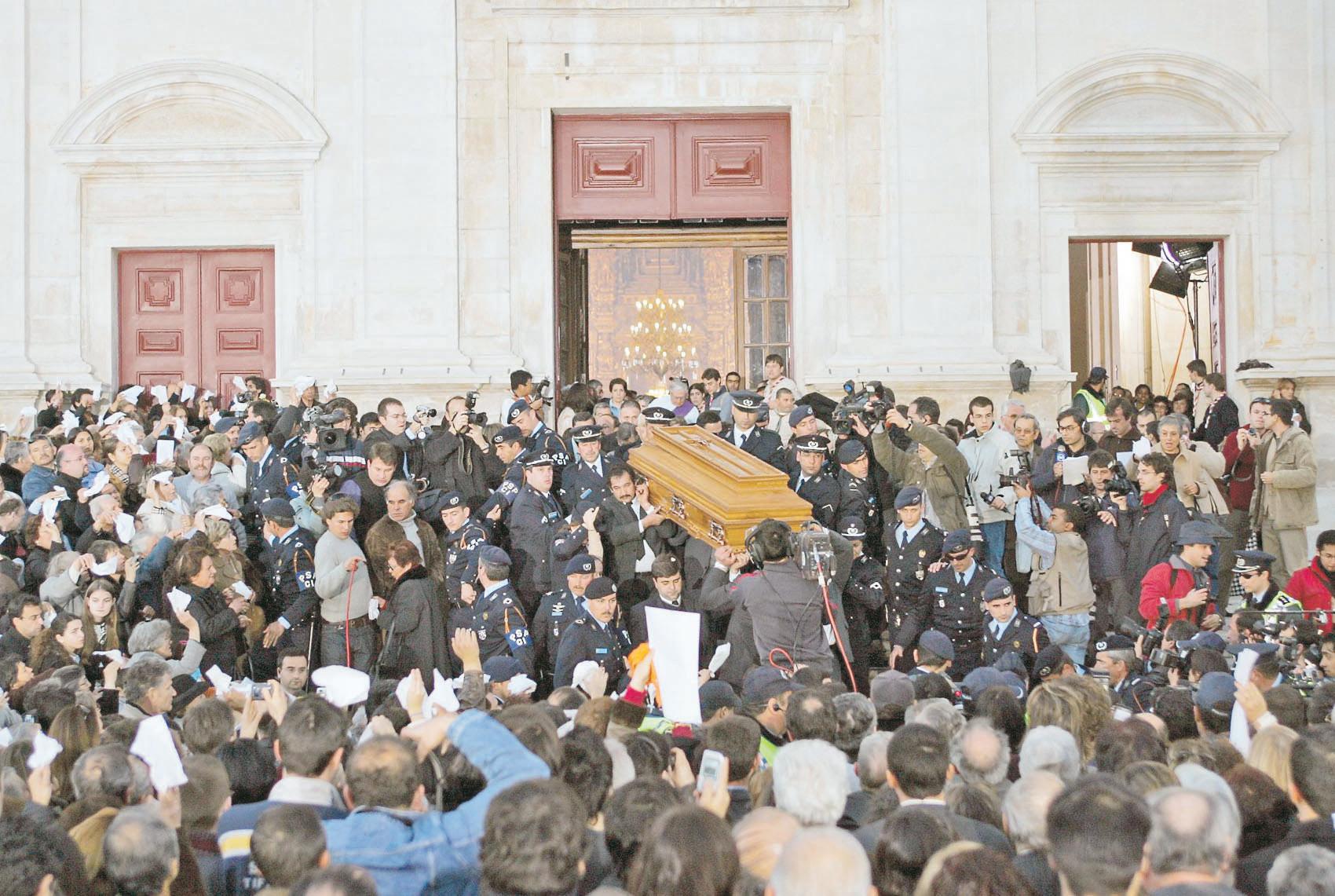
Secrets, superstitions, sainthood
Vatican will now have to deal with the conspiracy theorists
■ By Cindy Wooden
VATICAN CITY (CNS) - When Carmelite Sister Lucia dos Santosthe last of three Fatima visionaries - was buried in mid-February, a surprising number of people believed still-secret secrets of Fatima were buried with her.
Her February 13 death also led to widespread discussion in Italy about the number 13, given the fact that the Blessed Virgin Mary promised to appear to Lucia and her two cousins on the 13th of the month. The apparitions took place from May 13 to October 13, 1917.
And, of course, discussion began almost immediately about when the process to canonise her would begin. Her cousins, Francisco and Jacinta Marto, were beatified - a step toward sainthood - in 2000.
Italian Cardinal Tarcisio Bertone of Genoa, who celebrated Sister Lucia's funeral in the Pope's name, discussed all three issues with the press.
In 2000, when Pope John Paul II ordered the publication of the so-called "third secret" of Fatima - a description of a vision the Blessed Virgin Mary showed the childrengroups such as the Canadian-based Fatima Centre immediately began claiming that the publication was incomplete and the Vatican was hiding something.
And when Sister Lucia died, the Fatima Centre posted a message on
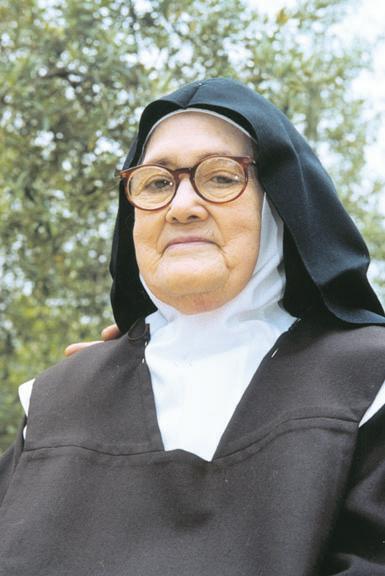
its Web site saying it would "continue to campaign for the release of the full third secret."
But Cardinal Bertone, who had spent hours with Sister Lucia discussing the third secret and the Vatican's interpretation of it before it was published, categorically denied anything remains a secret.
"I can say, without any doubt, that it is absolutely certain that everything having to do with the secret of Fatima has been revealed and that the third part of the secret is contained in the four pages that we published in their entirety and which correspond exactly to
the letter written personally by Sister Lucia," Cardinal Bertone said on February 14 before flying to Portugal for the funeral.
The Cardinal said he was aware that people, despite the affirmations of Pope John Paul - unquestionably devoted to the Fatima message - continue to claim there is more to the secret, but he insists the Vatican published everything in its possession.
"I explicitly asked Sister Lucia if she had written something before or after what has been published of the third secret. She herself confirmed that she had written nothing either before or after," Cardinal Bertone said.
After the funeral, Cardinal Bertone confirmed that Sister Lucia's computer and all the letters, diaries and other written material found in her cell at the cloister had been collected and sealed.
"They will be examined one by one in the process for her beatification, which will begin soon," the cardinal said. However, Cardinal Bertone did not give any timeline for the official opening of her cause, nor did he indicate whether he thought Pope John Paul would waive church rules requiring a five-year waiting period before the process could begin.
Jesuit Father Paolo Molinari, postulator of the cause for Blesseds Francisco and Jacinta, said he personally believes it is important to
wait. "We must avoid the danger of people thinking that she is being beatified or canonised just because of the visions," he told Catholic News Service on February 16.
"The apparitions of Our Lady and what Our Lady said certainly had an impact on Sister Lucia's life," he said, but they did not make her holy.
"She accepted the message and she lived according to the message for more than 80 years, offering her life for the sake of sinners. This is holiness, not just receiving the grace of a vision," the Jesuit said.
tions and was the date (May 13, 1981) of the attempted assassination of the Pope is something more than simple coincidence, I think," the Cardinal said. The Pope has linked the assassination attempt to the third secret of Fatima.
"In the same way, I think it is a heavenly sign that the Madonna called Sister Lucia to herself precisely on the 13th of February," the Cardinal said.
The Cardinal said people should remember the 13th of each month, "not out of superstition," but simply because God and the Blessed Virgin Mary had done extraordinary things on that date in the past.
Cardinal Bertone said he last visited Sister Lucia in November 2003 and told her that he would come to visit her again.
"She told me that I would not see
"She accepted the message and she lived according to the message for more than 80 years, offering her life for the sake of sinners. This is holiness, not just receiving the grace of a vision,"
The five-year wait allows the Church to confirm that a large number of the faithful around the world recognise in a prospective saint a special way of living the Christian faith and helping "bring God's love, mercy and goodness into the world because she modeled her life on the life of Jesus Christ," Father Molinari said.
As for the number 13, it was part of the story - at least in Italy - of Sister Lucia's passing.
Cardinal Bertone was asked to comment. "The fact that the number 13 connects almost all the appari-
her alive again, but that I would come only to bless her casket. She knew even this," the Cardinal told reporters.
"I am not saying this was a prophecy, but it was the simple truth," he said.
Page 16 February 24, 2005, The Record
- CNS
Faithful watch the coffin of Sister Lucia dos Santos leave the cathedral in Coimbra, Portugal, on February 15. Sister Lucia died in the Carmelite cloister in Coimbra on February 13 at the age of 97. She was buried temporarily at the Carmelite convent while preparations were made for final burial alongside her two cousins, Blesseds Francisco and Jacinto Marto, at Fatima.
Photo: CNS
Sr Lucia dos Santos














 Eddie Russell
Eddie Russell


























 ■ With Guy Crouchback
■ With Guy Crouchback









